Shows
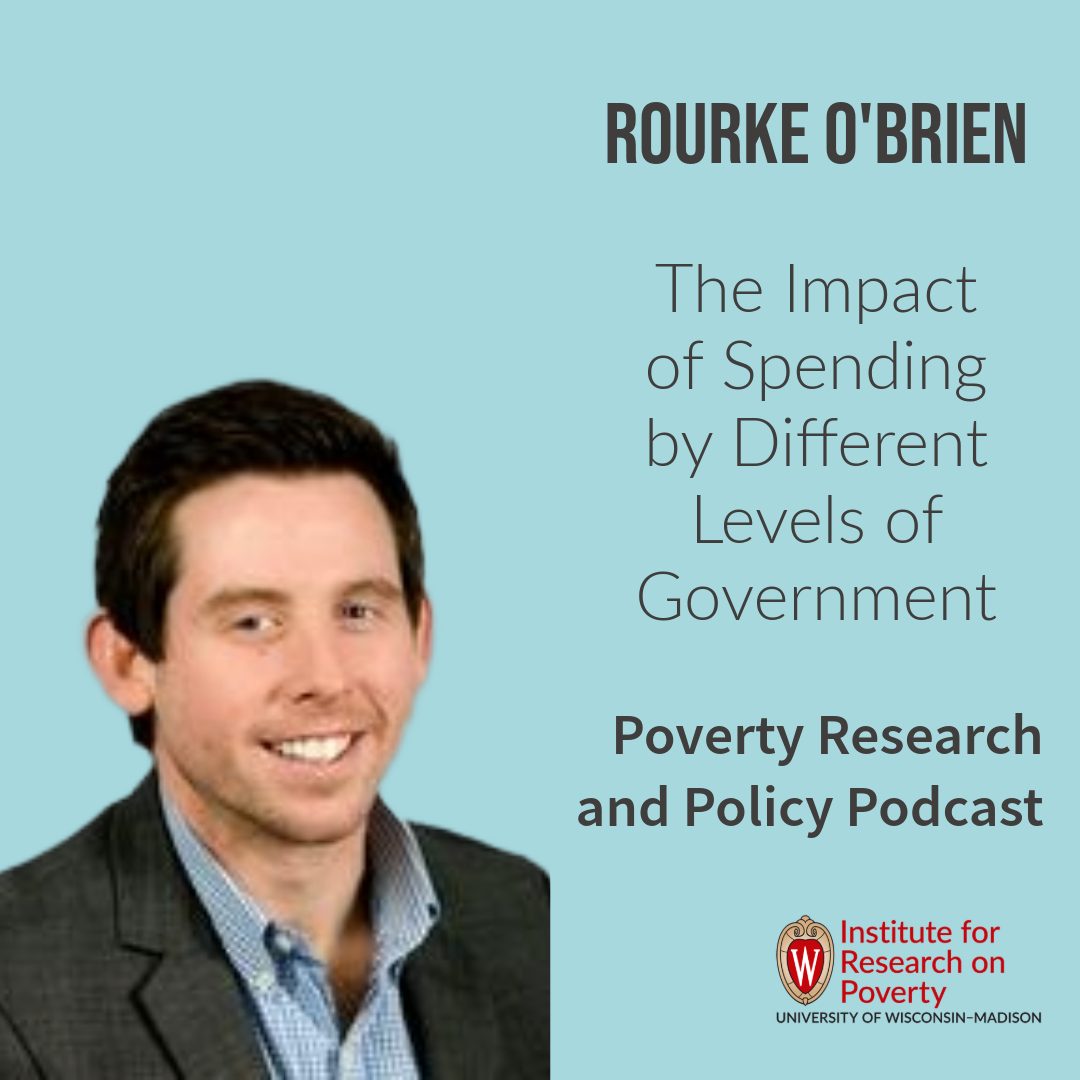
Poverty Research & PolicyRourke O'Brien on the Impact of Spending by Different Levels of GovernmentThere has been a lot of research on the impact of levels of public expenditures on a variety of social outcomes, including health and economic mobility. But beyond the dollars spent, some researchers say that we should also be considering what level of government oversees that spending. For this episode, Dr. Rourke O'Brien joins us to discuss his recent work on measuring fiscal centralization, and its tangible effects on people's lives. Rourke O'Brien is Associate Professor of Sociology & and of Public Health & Health Policy at Yale University and previously served as a Senior Policy Advisor at the...
2025-12-0932 min
Poverty Research & PolicyLuke Shaefer on the RX Kids Cash Transfer ProgramUnconditional cash transfers programs are being piloted across the country. For this episode, Dr. Luke Shaefer shares his work with RX Kids—the nation's first-ever, community-wide, prenatal and infant cash prescription program, which is taking place in Michigan. This innovative model uses a mix of TANF funds in combination with philanthropic dollars to offer support to all expecting and new moms in several low-income Michigan communities. Luke Shaefer is the Hermann and Amalie Kohn Professor of Social Justice and Social Policy at the Gerald R. Ford School of Public Policy at the University of Michigan. He is al...
2025-11-1139 min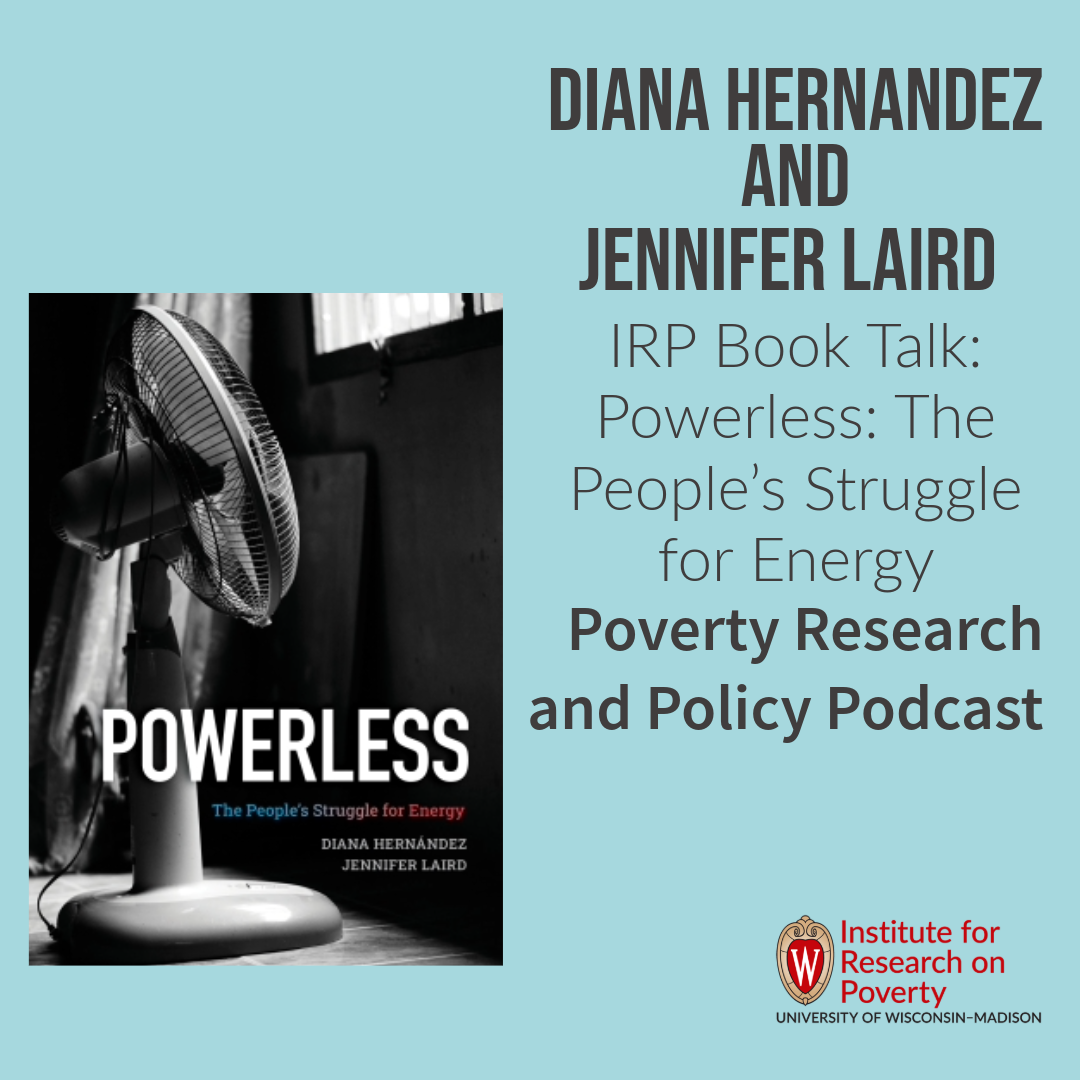
Poverty Research & PolicyIRP Book Talk: Diana Hernandez and Jennifer Laird on Energy InsecurityMillions of households in the United States struggle to maintain access to the energy necessary to heat and cool their home, to have power to cook and have hot water, and to literally keep the lights on. And a disconnection—or even the threat of having your power turned off—can be devastating. For this episode, Dr. Diana Hernandez and Dr. Jennifer Laird join us to discuss their new book, "Powerless: The People's Struggle for Energy." They share their research on the impact of energy insecurity and provide detailed policy and practice recommendations to address it. Diana Hern...
2025-10-1441 min
Poverty Research & PolicyIRP Book Talk: Jane Waldfogel on Child Benefits: A Smart Investment for America's Future
2025-09-0833 min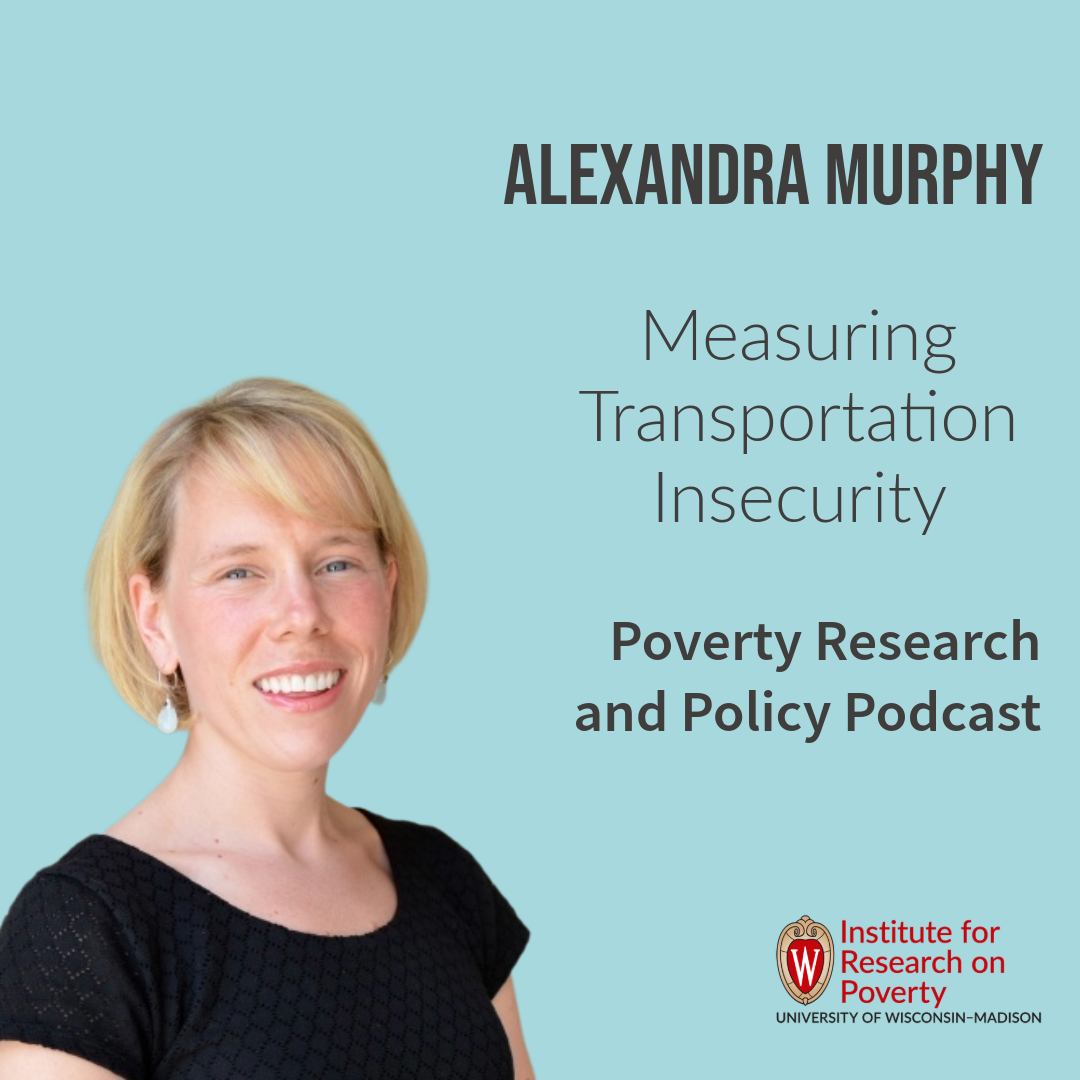
Poverty Research & PolicyAlexandra Murphy on Measuring Transportation Insecurity Material hardship like food or housing insecurity or inadequate access to medical care are routinely measured. But transportation insecurity has not been, despite its significance in the lives of people with low incomes, and the likelihood that it intersects with other forms of hardship. For this episode, Dr. Alexandra Murphy joins us to discuss her recent co-authored paper, titled, "How Does Transportation Insecurity Compare and Relate to Other Indicators of Material Hardship in the U.S.?" She shares her work constructing and implementing the Transportation Insecurity Index, and explains how it is being used across the country. Al...
2025-08-0829 min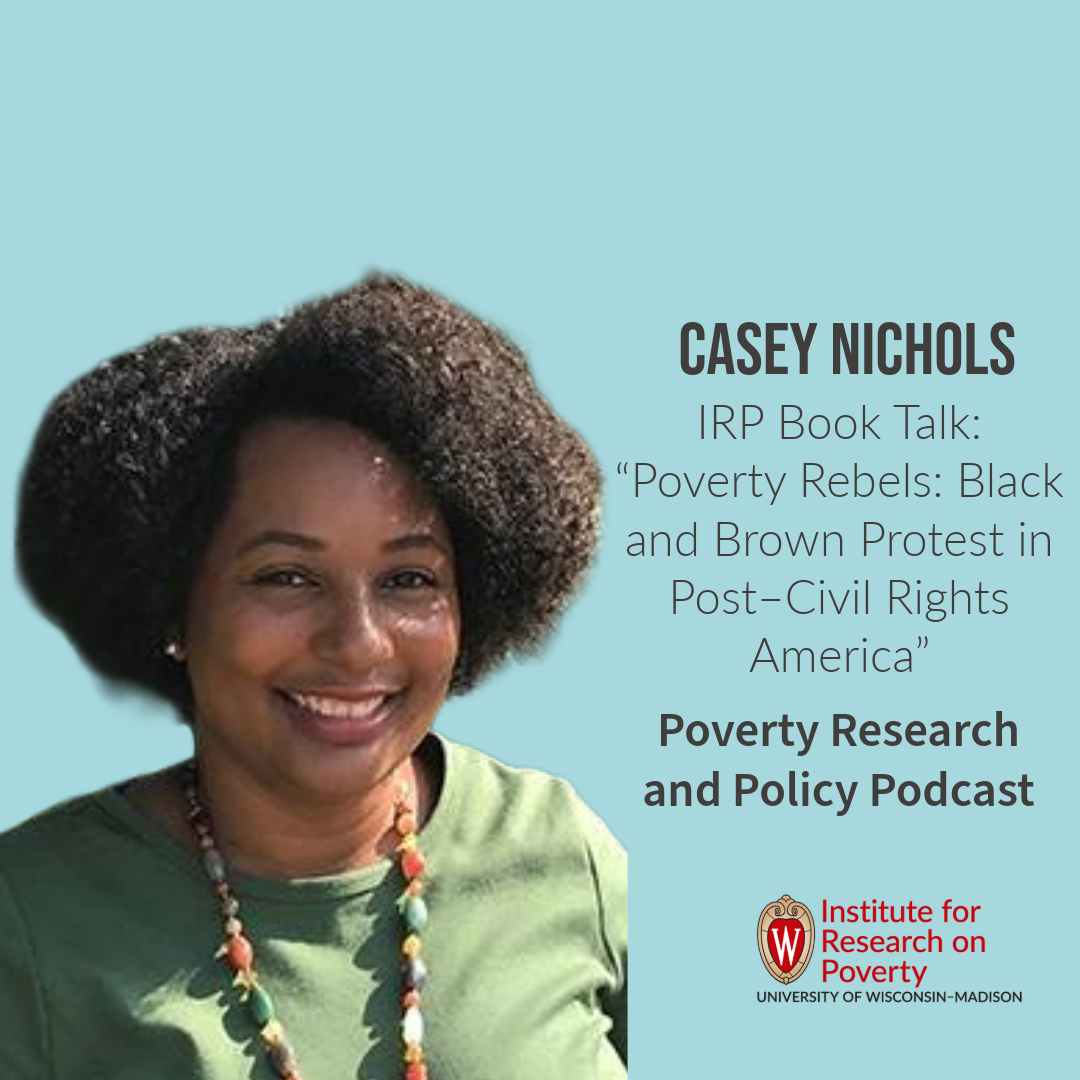
Poverty Research & PolicyIRP Book Talk: Casey Nichols on Poverty Rebels: Black and Brown Protest in Post–Civil Rights AmericaThe 1960s and 1970s were a time of tremendous change politically and culturally in the United States. Federal legislation and policy enshrined voting rights and implemented measures to increase equality, but there were still many areas in which those changes fell short for people of color and those living in poverty. In her new book, "Poverty Rebels: Black and Brown Protest in Post–Civil Rights America," Dr. Casey Nichols examines the history and legacy of local, state, and national activism through the lens of Black and Brown communities in Los Angeles between 1964 and 1979. Casey D. Nichols is as...
2025-06-2648 min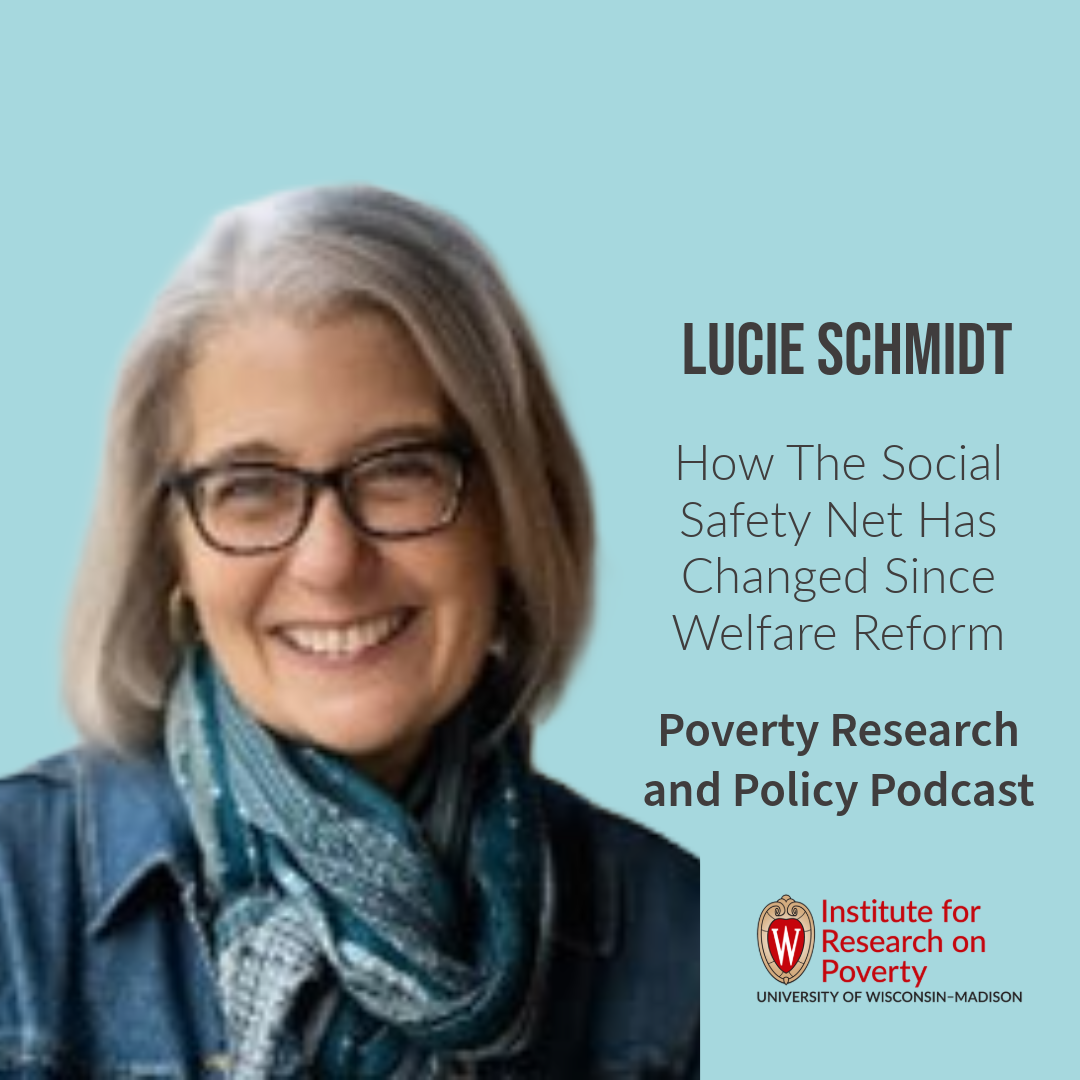
Poverty Research & PolicyLucie Schmidt on How The Social Safety Net Has Changed Since Welfare ReformThe Clinton-era Personal Responsibility and Work Opportunity Reconciliation Act of 1996 was a significant reform of the welfare system as it had been known. In this episode, Dr. Lucie Schmidt draws on her co-authored paper, "Did Welfare Reform End the Safety Net as We Knew It? The Record since 1996," to describe the safety net landscape before 1996, and how specific programs and overall coverage have changed since welfare reform was put in place. Lucie Schmidt is the Robert A. Woods Professor of Economics at Smith College and is a Research Associate at the National Bureau of Economic Research. She...
2025-06-0632 min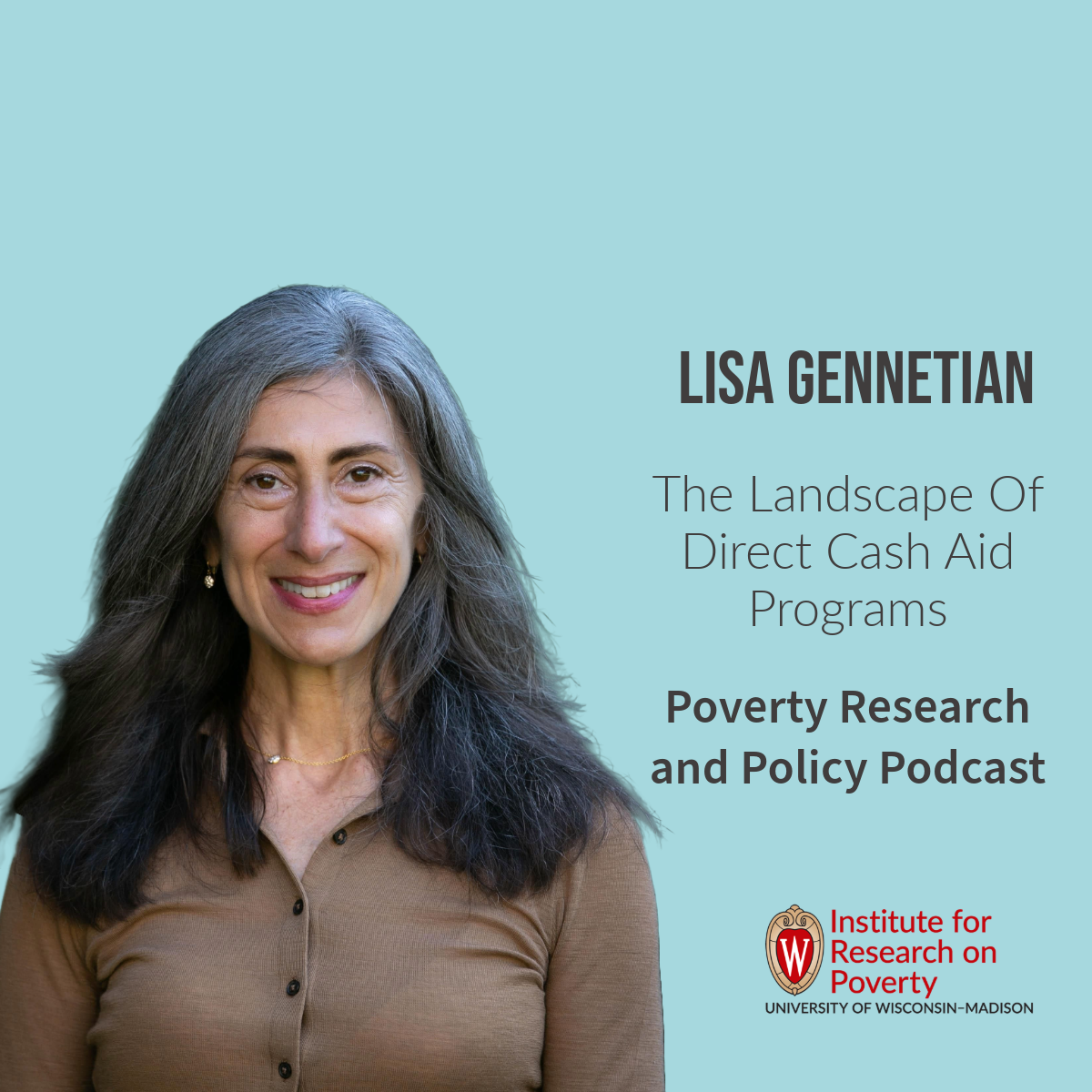
Poverty Research & PolicyLisa Gennetian On The Landscape Of Direct Cash Aid ProgramsMany countries use direct cash aid programs as an integral part of their social safety net. In the United States, there have been few national efforts, but more and more guaranteed income programs are being implemented at state, county, and local levels. In this episode, Dr. Lisa Gennetian draws on her co-authored paper, "Unconditional Cash Transfers for Families with Children in the U.S.: A Scoping Review," to provide an overview of cash assistance programs both in the US and in other countries, with a particular focus on programs aimed at families with children. Lisa Gennetian is...
2025-04-2335 min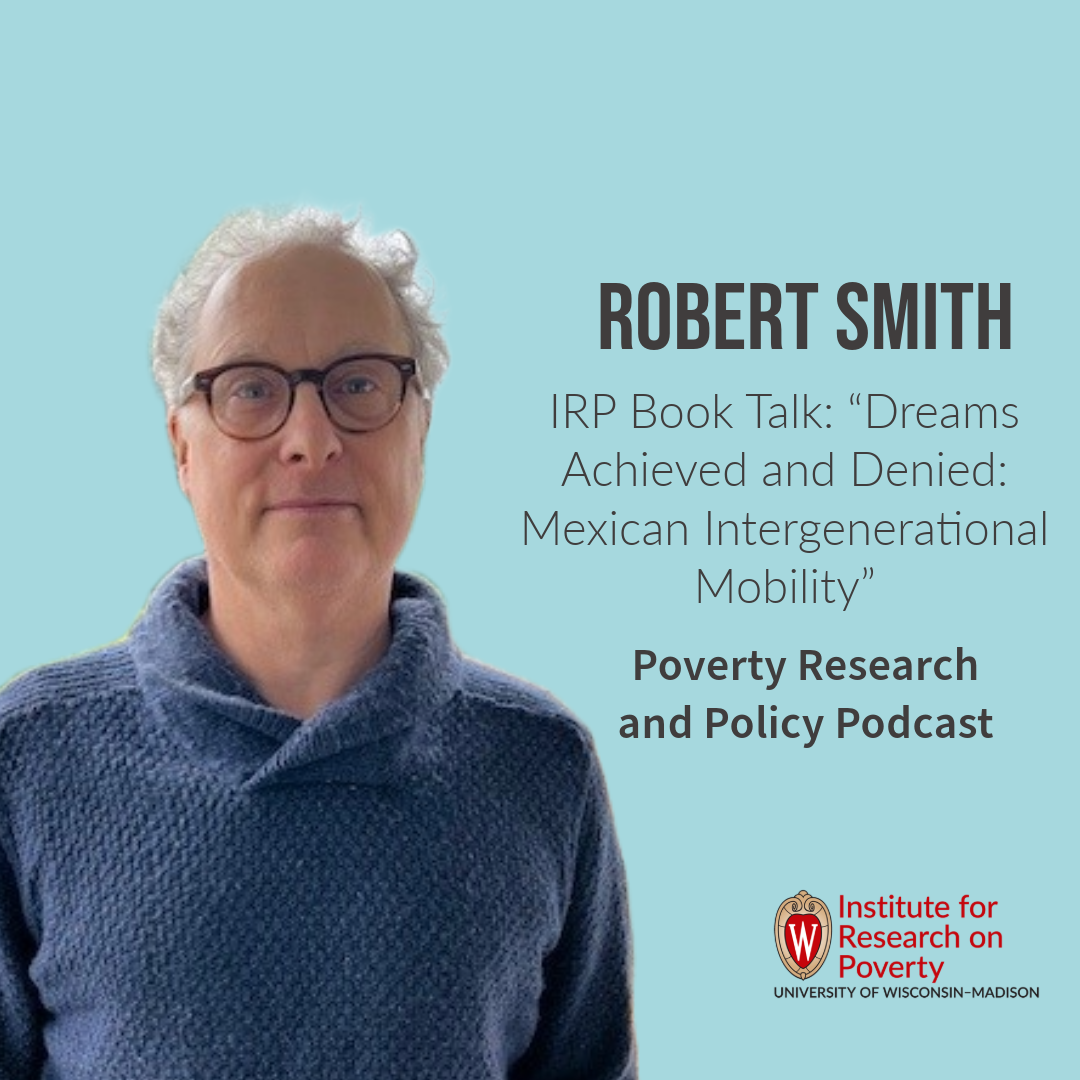
Poverty Research & PolicyIRP Book Talk: Robert Courtney Smith on "Dreams Achieved and Denied: Mexican Intergenerational Mobility" There are many factors that influence whether Mexican immigrants to the United States are able to achieve upward mobility. In his new book, "Dreams Achieved and Denied: Mexican Intergenerational Mobility," Robert Courtney Smith shares research conducted over twenty years and involving nearly one hundred children of Mexican immigrants in New York City. He examines how being documented or not acts as a master status, and how that is expressed through choices about education, employment, social networks, expressions of masculinity, and romantic and familial relationships. Robert Courtney Smith is a Professor of Sociology, Immigration Studies and Public Affairs at...
2025-02-2437 min
Poverty Research & PolicyMolly Costanzo on Improving the Economic Well-being for Households with Children with DisabilitiesBetween 5% and 20% of children in the United States live with a disability. The definition and measurement of disability are constantly changing. Therefore, people with disabilities have been inadequately represented and understudied in research. In this episode, Molly Costanzo shares her research on the economic well-being for households with children with disabilities and recommendations for policymakers, practitioners, and researchers to improve their quality of life. Molly Costanzo is a scientist at the Institute for Research on Poverty. She has a PhD in social welfare from the University of Wisconsin-Madison. Her research focuses broadly on policies that support children a...
2025-01-2821 min
Poverty Research & PolicyKathryn Thompson on Quality of Care for Pregnant Black Medicaid EnrolleesThere are many ways to assess the quality of care that pregnant people receive pre- and post-partum, as well as during delivery itself. Dr. Kathryn Thompson shares her findings on how the care that pregnant Black Medicaid enrollees receive compares to their more affluent white peers, and the policy and practice opportunities for addressing the social determinants of health that are involved. Kathryn Thompson is an Assistant Professor at Boston University's School of Public Health in the departments of Community Health Sciences and Health Law, Policy, and Management. She is also an IRP 2024–2025 Visiting Poverty Scholar.
2024-12-1826 min
Poverty Research & PolicyColleen Heflin on SNAP and Reauthorization of the Farm BillThe federal Farm Bill expired at the end of September 2024 and was not reauthorized. Funding for the Supplemental Nutrition Assistance Program (SNAP) has been extended through a Continuing Resolution, but that is a stopgap measure. For this episode, Dr. Colleen Heflin joins us to discuss the recent policy brief that she co-authored with Camille Barbin, titled, "How Does the Reauthorization of the Farm Bill Impact SNAP?" Colleen Heflin is a Professor of Public Administration and International Affairs in the Maxwell School of Citizenship and Public Affairs at Syracuse University. She is also a Senior Research Associate in t...
2024-11-1920 min
Poverty Research & PolicyAnne Sebert Kuhlmann on the Impact of Menstrual Poverty on Vulnerable IndividualsMenstrual poverty, or unmet menstrual hygiene needs, is defined as a lack of appropriate menstrual products in necessary quantities; access to soap and water for proper hygiene; or ways to dispose of or wash used sanitary materials. The experience of menstrual poverty can have far-reaching impacts on mental and physical health, the ability to work, and consistent school attendance. For this episode, Dr. Anne Sebert Kuhlmann discusses her research on the impacts of menstrual poverty, and what practice and policy options are available to alleviate the burden on menstruating people. Reference Papers: The E...
2024-10-3134 min
Poverty Research & PolicyKatherine Michelmore On Effects of the Expanded Child Tax Credit on Housing Stability for Low-Income Families When the Child Tax Credit (CTC) was expanded in 2021 in response to the COVID-19 crisis, it provided more support to parents and on a monthly basis. In addition, some very low-income families were eligible to access the CTC for the first time. In this episode, Dr. Katherine Michelmore shares insights from the paper that she co-authored with Natasha Pilkauskas and Nicole Kovski, titled, "The Effects of the 2021 Child Tax Credit on Housing Affordability and the Living Arrangements of Families With Low Incomes." Katherine Michelmore is an Associate Professor in the Gerald R. Ford School of Public Policy a...
2024-10-0129 min
Poverty Research & PolicyGreg Wilson on Racialization in the Nonprofit SectorBlack-Led Organizations (BLOs) are organizations led by an Executive Director and have a majority of full-time employees identifying as African American. BLOs face challenges (e.g., limited funding, diminished agency, exploitation) which can be explained through the framework of racialization. In this episode, Dr. Greg Wilson discusses his research paper titled "An Invisible Impediment to Progress: Perceptions of Racialization in the Nonprofit Sector" that analyzes racialization of BLOs in Madison, Wisconsin. Dr. Greg Wilson is an Assistant Professor at The Ohio State University, a previous IRP Graduate Research Fellow, and previous IRP Dissertation Fellow. He is interested...
2024-09-0334 min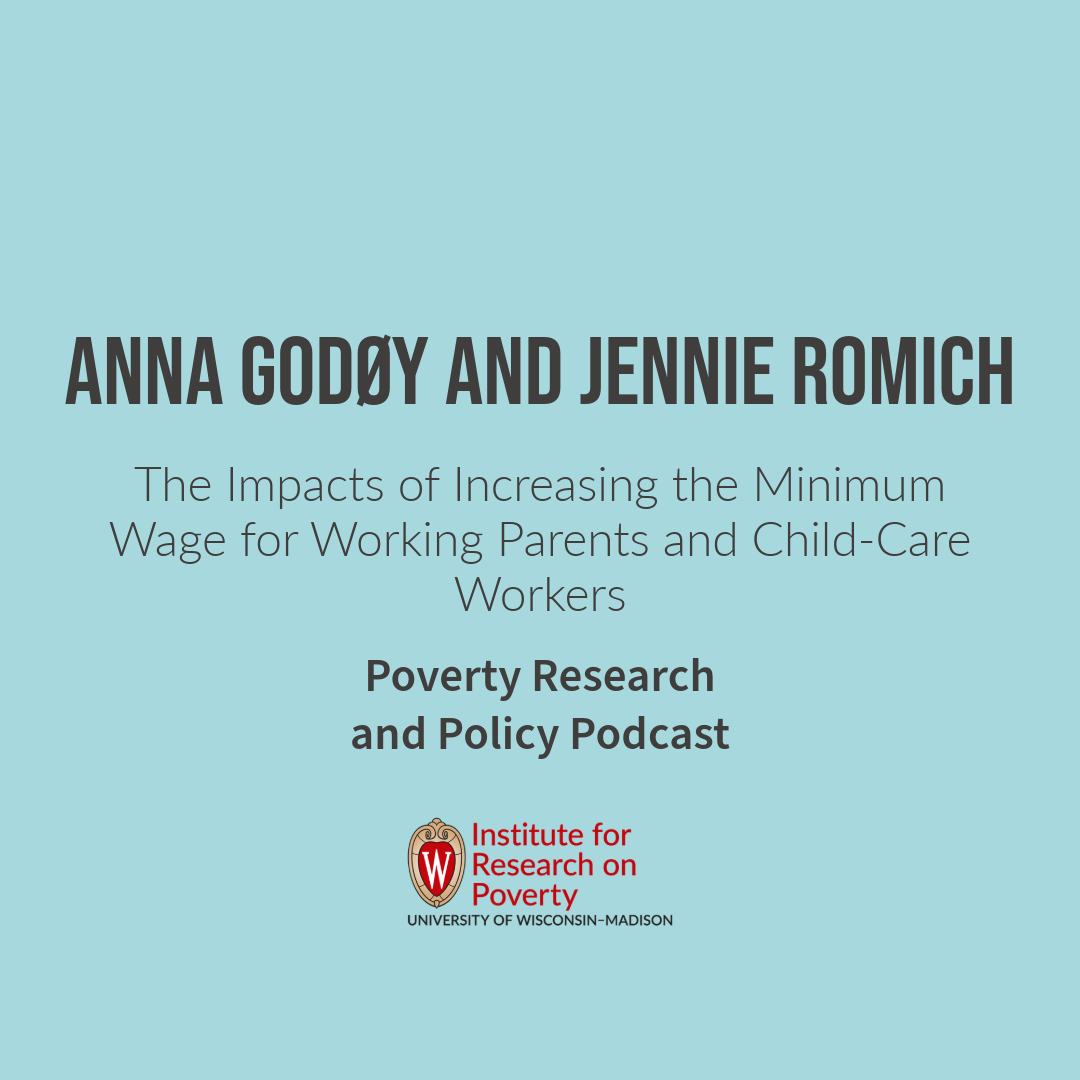
Poverty Research & PolicyAnna Godøy and Jennie Romich on the Impacts of Increasing the Minimum Wage for Working Parents and Child-Care WorkersMinimum wage workers, especially those with children, face barriers to affordable child care. Child care costs can prevent working parents who earn minimum wage from participating in the labor market. Alternately, many child-care workers also face financial barriers because they, too, earn minimal wages. Therefore, increasing the minimum wage would alleviate financial burdens for both parents and child-care workers. In this episode, both Dr. Anna Godøy and Dr. Jennie Romich discuss their research on minimum wage and its effects on parental labor supply and the child care sector. Anna Godøy is a Senior Research Fellow at...
2024-08-1528 min
Poverty Research & PolicyCarl Gershenson On Eviction and the Rental Housing Crisis in the Rural United StatesThere are more than 17 million renters in the rural Unites States. While popular perceptions of eviction may be that they are predominantly an urban issue, low-income rural renters face some unique challenges in finding and maintaining secure housing. Dr. Carl Gershenson shares insights from his extensive work on eviction, and in particular from the paper that he co-authored with Dr. Matthew Desmond, titled "Eviction and the Rental Housing Crisis in Rural America." Carl Gershenson is Lab Director at The Eviction Lab at Princeton University. His research focuses on the causes and consequences of housing instability, with a...
2024-07-1637 min
Poverty Research & PolicyJosé Loya On How Race, Gender, And Age affect Access To Mortgage Credit And The Implications For InequalityHomeownership is one of the most common ways to accumulate wealth and promote intergenerational economic mobility in the United States. But even with laws and policies designed to ensure equal access to housing and financing, access to mortgage credit is far from equal. Factors like the race, gender, and age of the applicant can result in less favorable loan terms and higher rates of denial and default. Dr. José Loya discusses his research on how different demographic factors affect access to mortgage financing, and what policy and practice approaches might help to lessen inequity in this area. J...
2024-06-2036 min
Poverty Research & PolicyMarci Ybarra on Challenges for Latina Mothers Before and During the COVID-19 PandemicCOVID-19 interrupted life on multiple levels for many people regardless of race, economic class, or citizenship. For Latina mothers who either lacked legal status or were part of a mixed-status household, the pandemic intensified the challenges they faced even before this health and economic crisis. In their paper, "No Calm Before the Storm: Low-Income Latina Immigrant and Citizen Mothers Before and After COVID-19," Dr. Marci Ybarra and Francia Mendoza Lua share insights gained through interviews with Latina moms in Chicago before and during the pandemic. Dr. Ybarra is an Associate Professor in the Sandra Rosenbaum School of Soci...
2024-04-0131 min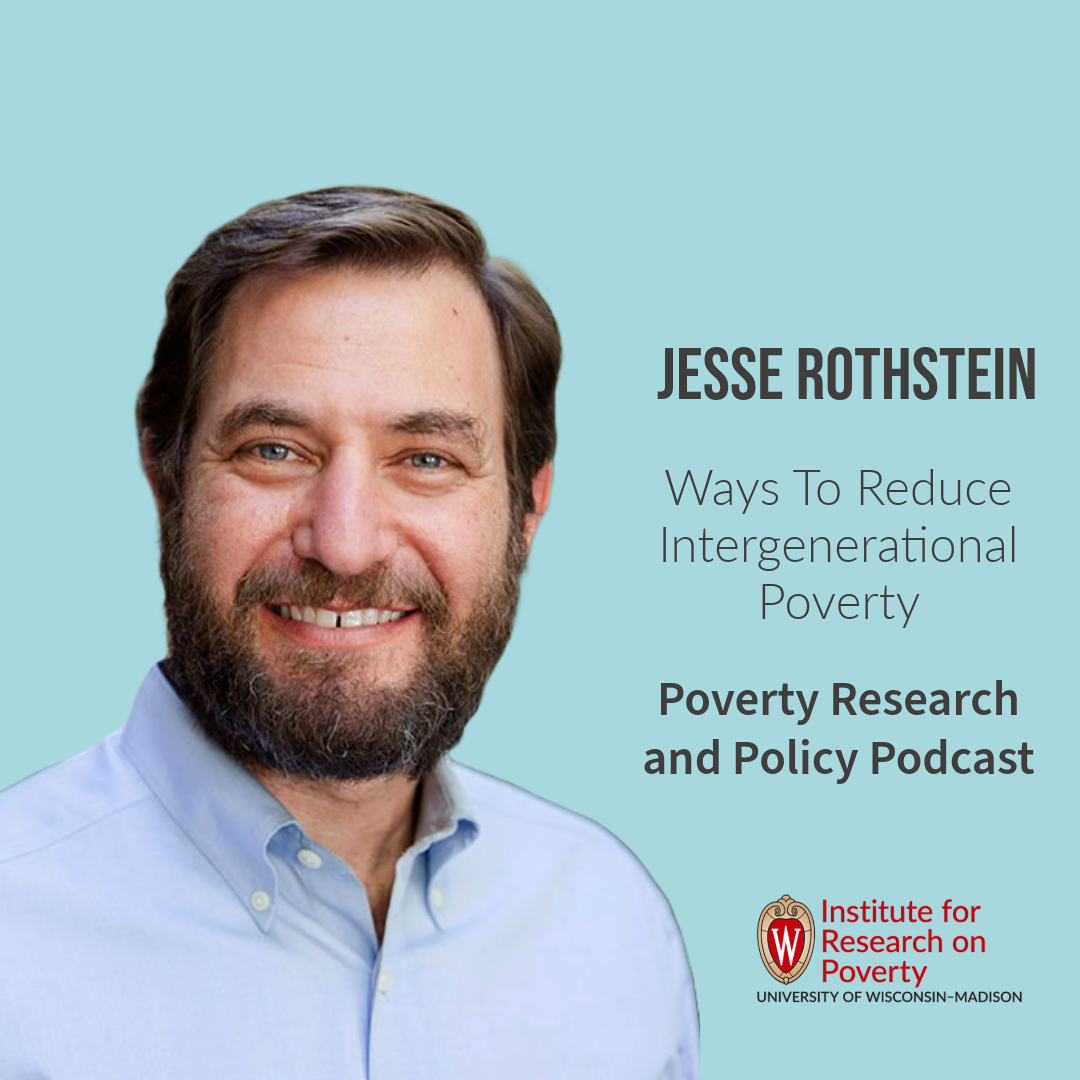
Poverty Research & PolicyJesse Rothstein On Ways To Reduce Intergenerational PovertyExperiencing poverty in childhood can hinder a person's opportunities throughout their own lifetime, and those of their children and grandchildren as well. The National Academies of Sciences, Engineering, and Medicine recently released a report titled "Reducing Intergenerational Poverty." For this episode, we're joined by Jesse Rothstein, who served as a member of the committee that produced the report. He shares the research and findings on several of the key drivers of intergenerational poverty that the committee identified and examined, as well as what policy approaches may help to interrupt the cycle and why that matters. Dr. Jesse R...
2024-03-1928 min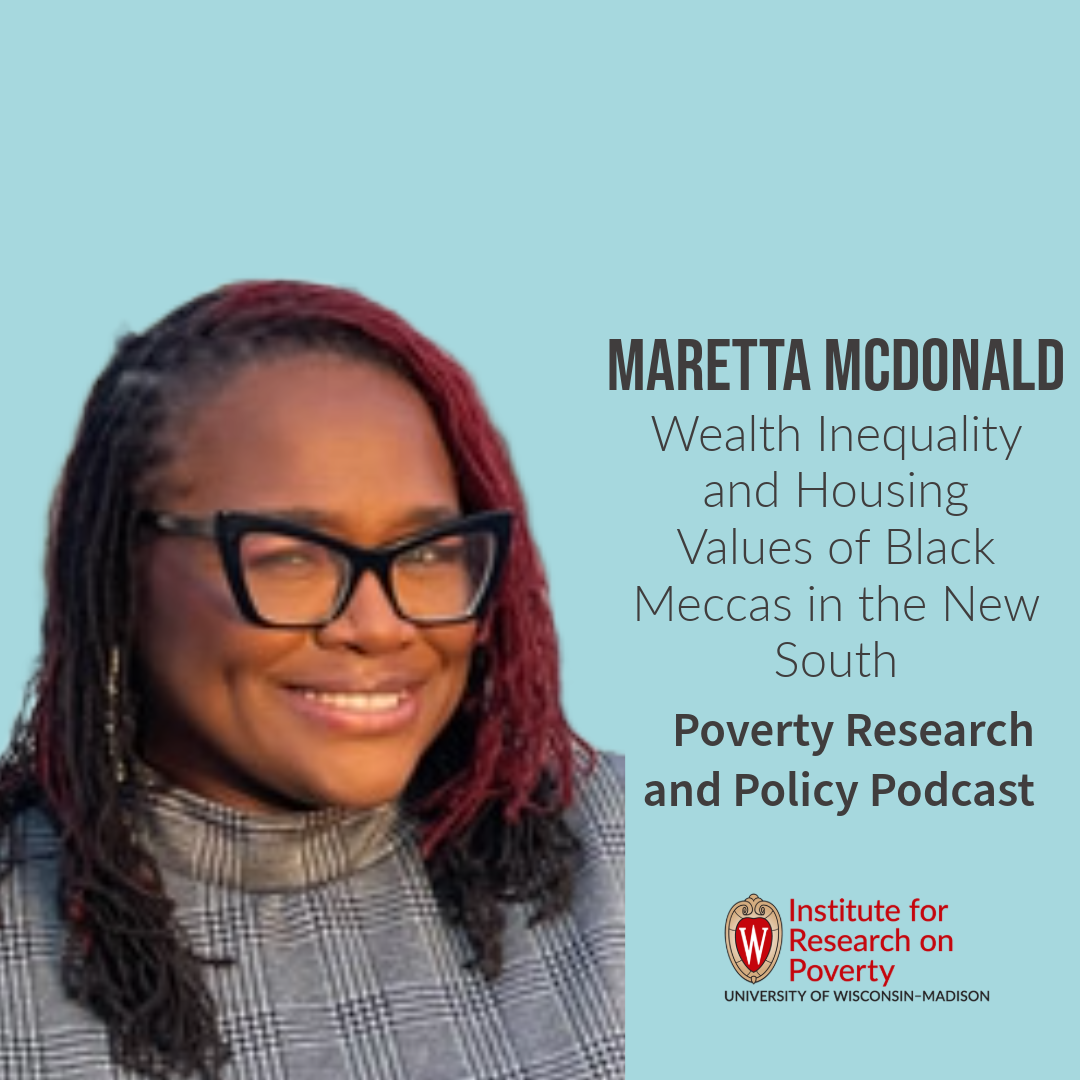
Poverty Research & PolicyMaretta McDonald on Wealth Inequality and Housing Values of Black Meccas in the New SouthBlack Meccas are cities where it appears that Black communities thrive more-so than other places in the United States. However, the housing values of Black-owned properties in these areas are substantially lower compared to their white counterparts, revealing the presence of wealth inequality even in cities where Black people are thought to experience better overall economic well-being. In this episode, Dr. Maretta McDonald discusses her recent co-authored paper "Wealth Matters: Home Ownership, Housing Values, and the Model Minority Myth of Black Meccas in the New South." Maretta McDonald is a 2022-2024 IRP National Poverty Fellow and an A...
2024-02-2327 min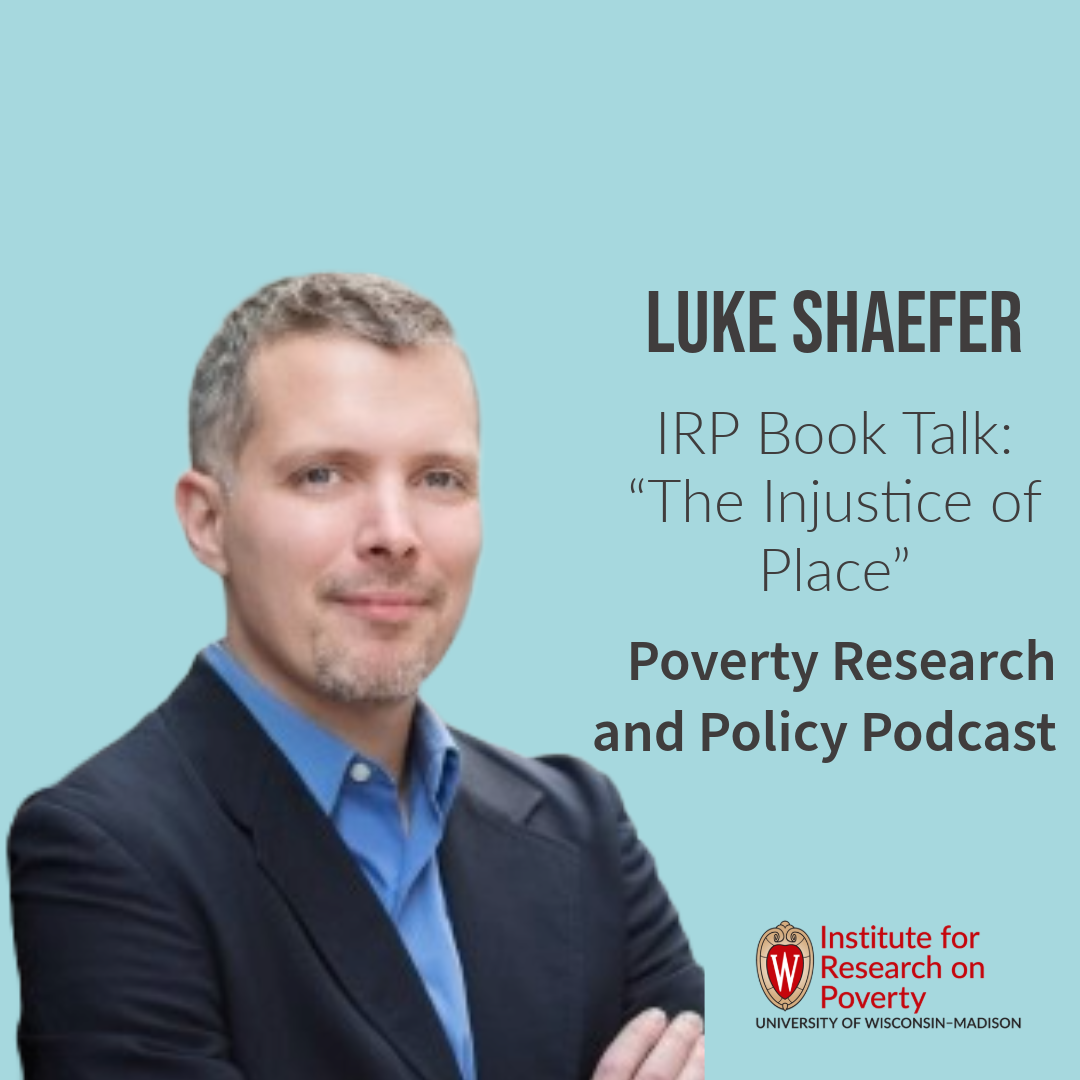
Poverty Research & PolicyIRP Book Talk: Luke Shaefer on "The Injustice of Place: Uncovering the Legacy of Poverty in America"Where you live can affect the quality of education you receive, your chances of finding a good job, and even how long you might live. In their new book, "The Injustice of Place: Uncovering the Legacy of Poverty in America," Dr. Luke Shaefer and his co-authors Kathryn Edin and Timothy Nelson create a new way of looking at poverty, called the Index of Deep Disadvantage. Their team spends time in and learns about the communities that have the worst scores, and find that legacies of profound racism, extractive big industry, and crumbling social infrastructure contribute to generations of people...
2024-01-2637 min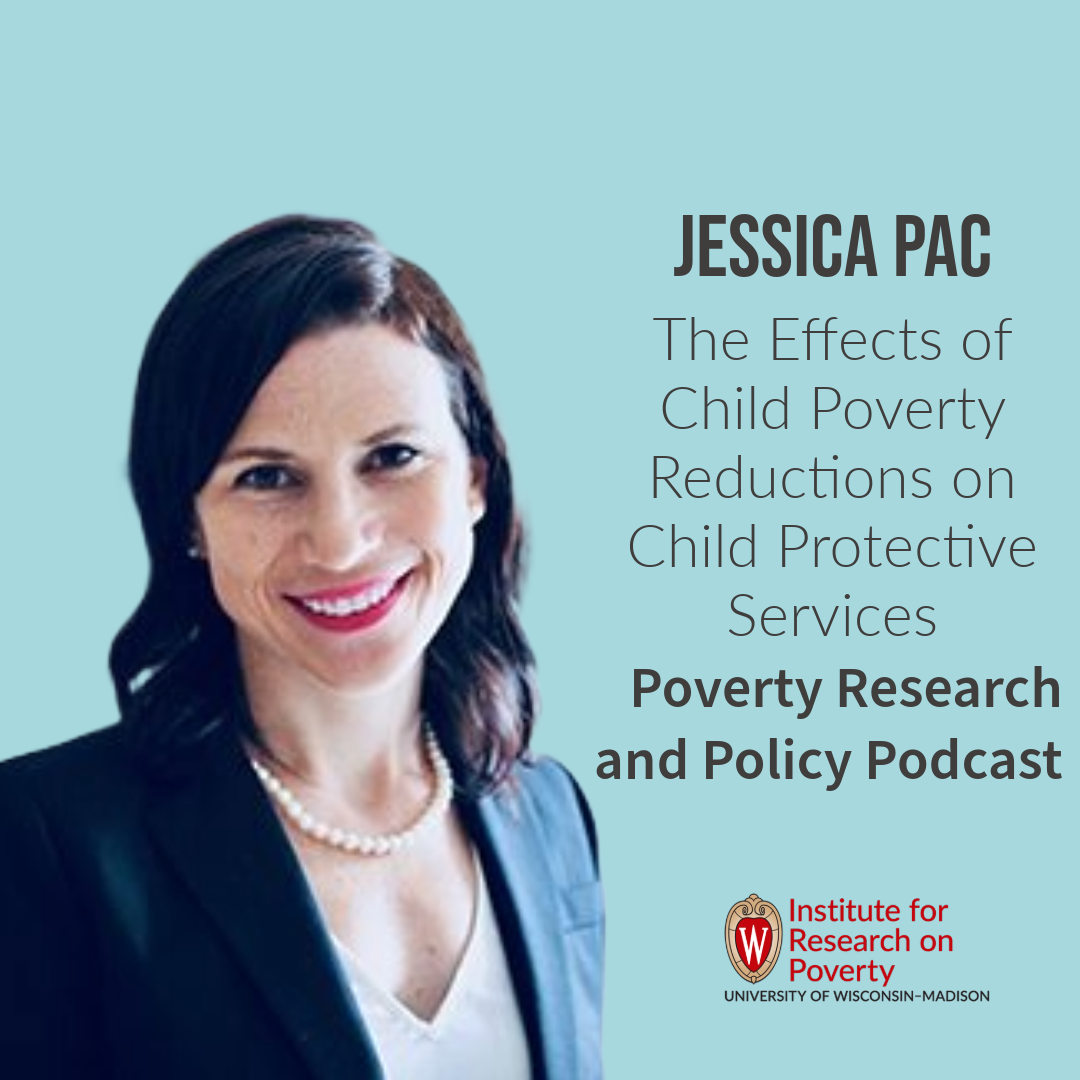
Poverty Research & PolicyJessica Pac on the Effects of Child Poverty Reductions on Child Protective Services InvolvementChild Protective Services (CPS) involvement is common, especially for children experiencing poverty, or who are Black or Native American. About a third of children are subject to a CPS investigation before their 18th birthday, but research shows reducing child poverty could help change this. In this episode, Dr. Jessica Pac discusses the recent paper she co-authored titled, "The Effects of Child Poverty Reductions on Child Protective Services Involvement." Jessica Pac is an Assistant Professor of Social Work at the University of Wisconsin-Madison. Professor Pac's research broadly harnesses applied econometric and data science methods to provide novel insight on man...
2024-01-0821 min
Poverty Research & PolicyWilliam Darity Jr. and Kirsten Mullen on Why It's Time to Pay Reparations to Black AmericansReparations for Black Americans is not a new idea—before the U.S. Civil War had ended, there was a proposal to provide freed Black people with "40 acres and a mule." That did not materialize, and in the ensuing century and a half, the Black descendants of formerly enslaved people have faced systemic injustices, discrimination, and violence. In this episode, Professor William "Sandy" Darity, Jr. and Kirsten Mullen explain what a meaningful reparations program for Black Americans would entail, how eligibility should be determined, and why the federal government is both the "culpable and capable party." Sandy Da...
2023-12-0546 min
Poverty Research & PolicyDayna Johnson on How Racism and Poverty Contribute to Sleep DisparitiesMany people suffer from not getting enough sleep from time to time. But for many people of color and those who are living in low-income neighborhoods and housing, additional factors may contribute to chronic poor sleep quality. Those factors can have long-term impacts on their health and well-being, including higher rates of heart disease, diabetes, high blood pressure, stroke, obesity, and depression. In this episode, Dr. Dayna Johnson shares her research into how experiences of racism, variable work schedules, and neighborhood conditions contribute to sleep and health inequities for African Americans. Dr. Johnson is a sleep epidemiologist a...
2023-11-2735 min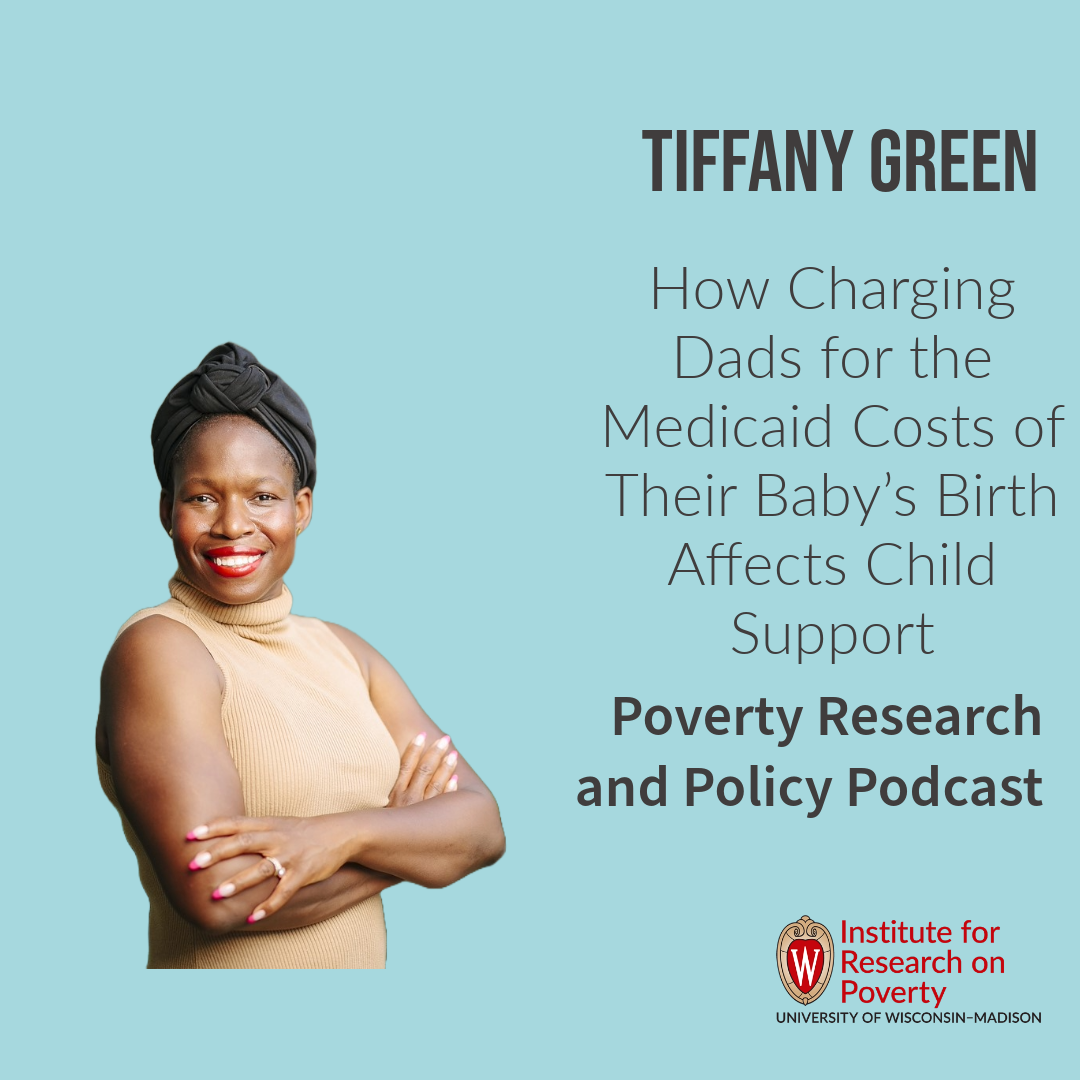
Poverty Research & PolicyTiffany Green on How Charging Dads for the Medicaid Costs of Their Baby's Birth Affects Child Support Wisconsin is one of a few states with a Birth Cost Recovery program, which bills unmarried, non-custodial fathers for the birth costs of their child when the mother is on Medicaid. But the impacts of these policies on the children and both parents have not been studied closely. In this episode, Dr. Tiffany Green discusses the report that she co-authored titled, "Effects Of Medicaid Birth Cost Recovery Policy Changes On Child Support Outcomes," which draws on IRP's Wisconsin Administrative Data Core (WADC). Tiffany Green is an associate professor in the Departments of Population Health Sciences and Obstetrics an...
2023-11-0819 min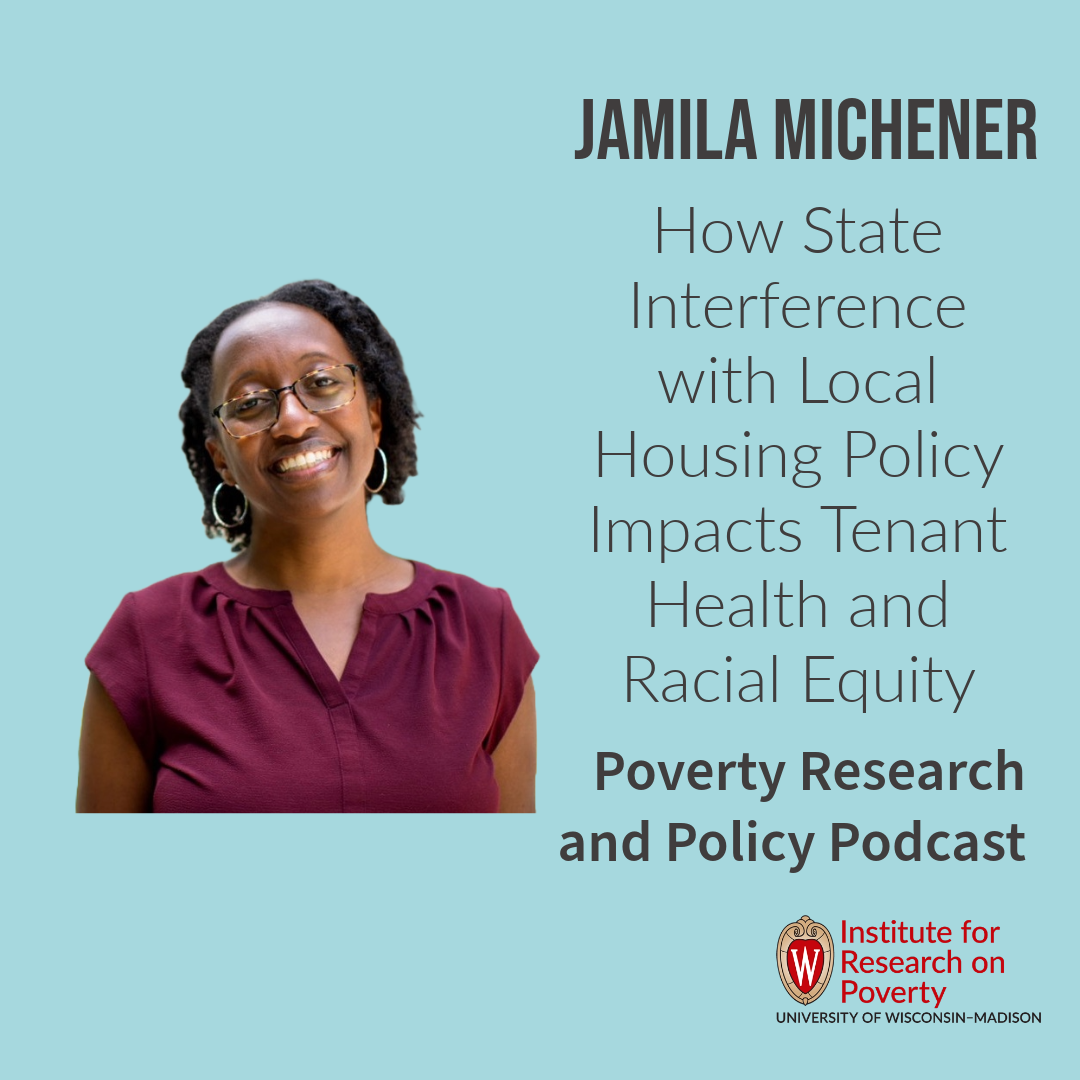
Poverty Research & PolicyJamila Michener on How State Interference with Local Housing Policy Impacts Tenant Health and Racial EquityWhether renters have access to safe, high-quality housing has serious implications for health and health equity. Local housing policy often focuses on community residents' particular needs, yet state law can preempt local ordinances, frequently with detrimental results. In this episode, Dr. Jamila Michener discusses two of her recent papers, "Entrenching Inequity, Eroding Democracy: State Preemption of Local Housing Policy" and "Racism, Power, And Health Equity: The Case of Tenant Organizing." Jamila Michener is an Associate Professor of Government and Public Policy at Cornell University. She studies poverty, racism, and public policy, with a particular focus on health...
2023-10-2442 min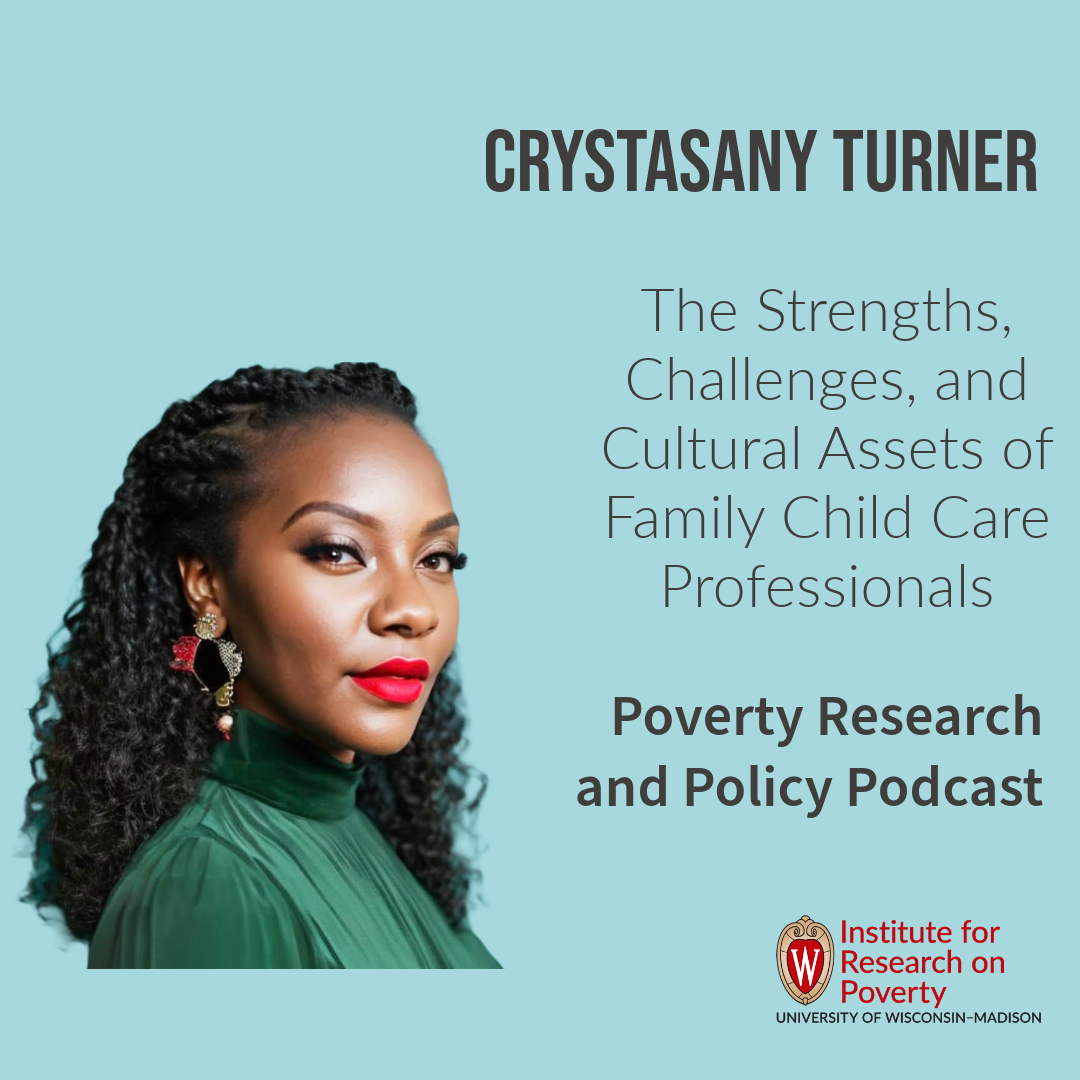
Poverty Research & PolicyCrystasany Turner on the Strengths, Challenges, and Cultural Assets of Family Child Care ProfessionalsFamily child care is the care of non-relative children within the providers' home. Thirty percent of family child care professionals are women of color, and oftentimes the cultural assets they contribute to the field of early care and education are diminished or disregarded. In this episode, Dr. Crystasany Turner discusses her research highlighting both the strengths and challenges faced by family child care professionals, future research, and practices to support family child care professionals. Crystasany Turner is an Assistant Professor of Early Childhood Education in the Department of Teaching and Learning at the University of Wisconsin-Milwaukee. Rooted in...
2023-10-0623 min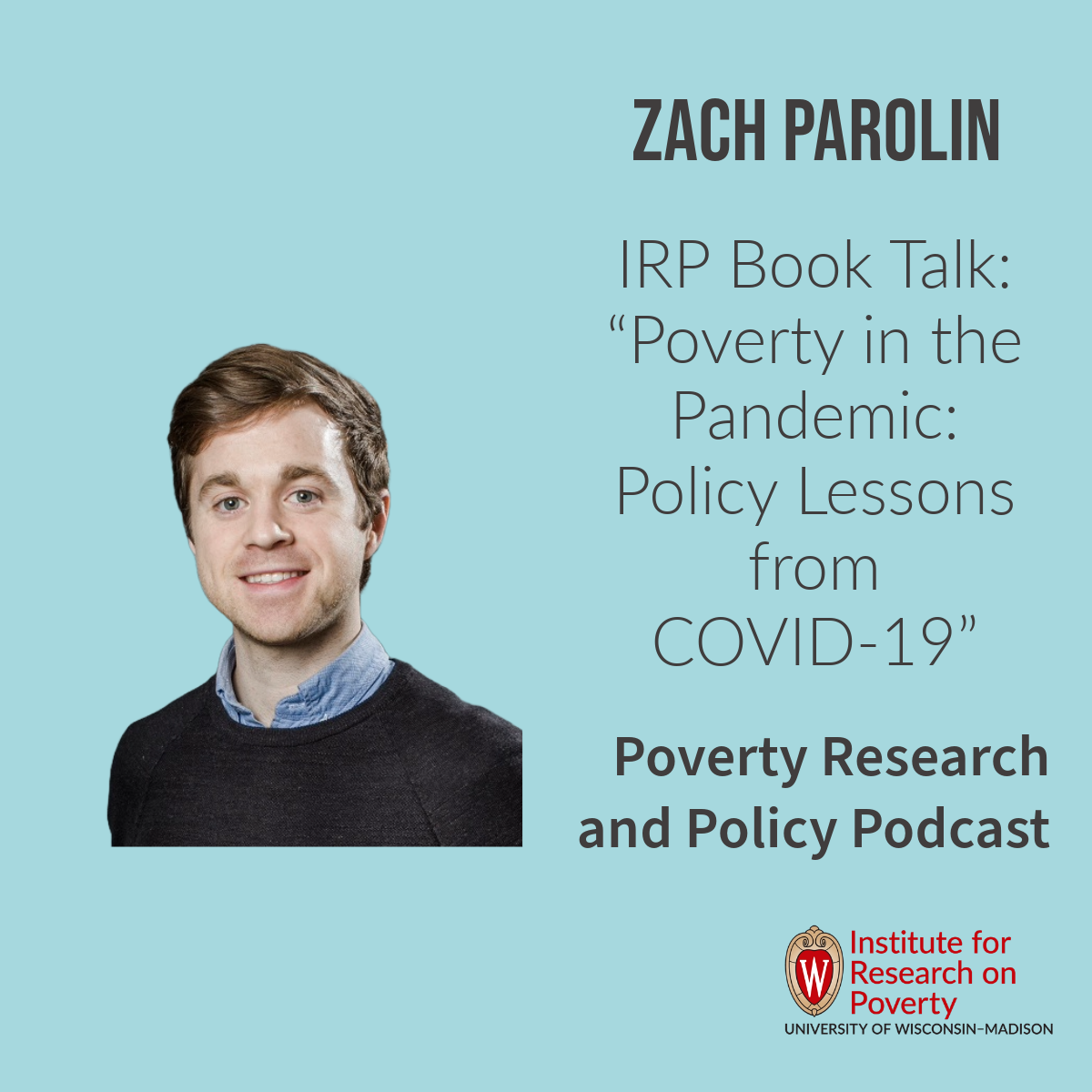
Poverty Research & PolicyIRP Book Talk: Zach Parolin on "Poverty in the Pandemic: Policy Lessons from COVID-19"In his new book, Dr. Zachary Parolin explores three perspectives on poverty—poverty as a risk factor, poverty as an expression of access to current resources, and poverty as a stratifying factor—and how they affected people during the COVID-19 pandemic. He advocates for policy approaches that will both prepare us for the next large-scale economic disruption and provide timely assistance when upheaval occurs, and makes the case for more frequent, and more nuanced poverty measures. Zach Parolin is an Assistant Professor of Social Policy at Bocconi University in Milan, Italy, and a Senior Research Fellow at Colu...
2023-09-0731 min
Poverty Research & PolicyManny Teodoro On Increasing Water Affordability through a Permanent Federal Water Assistance Program The federal government established a temporary water assistance program to alleviate the burden of water costs on households during the COVID-19 pandemic. Establishing a permanent water assistance program can increase long-term water affordability for households. In this episode, Dr. Manny Teodoro discusses the report he co-authored for the National Association of Clean Water Agencies that assessed options for a permanent federal water assistance program and shares how extending SNAP benefits would help increase water affordability. Manny Teodoro is the Robert and Sylvia Wagner Professor at the La Follette School of Public Affairs at the University of Wisconsin–Madi...
2023-08-2938 min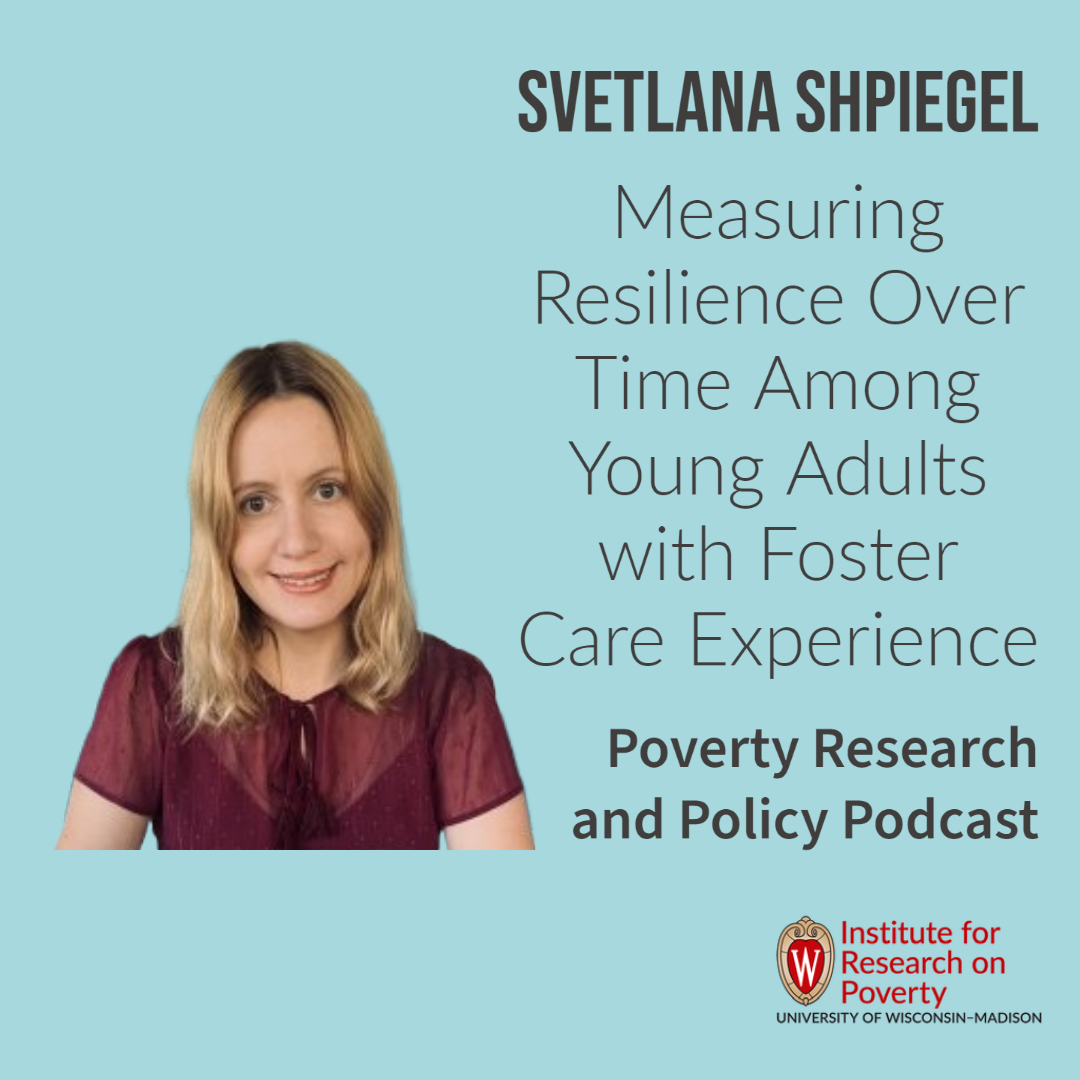
Poverty Research & PolicySvetlana Shpiegel on Measuring Resilience Over Time Among Young Adults with Foster Care ExperienceThere are known protective factors that can help young people exiting foster care to thrive by reducing or eliminating the challenges that they often face. By measuring resilience over time, and viewing it as "a state, not a trait," there is more opportunity to create networks and systems to support these young people as they transition to adulthood. In this episode, Dr. Svetlana Shpiegel discusses her co-authored paper, "Resilient Outcomes among Youth Aging-Out of Foster Care: Findings from the National Youth in Transition Database," and shares how she and her colleagues assessed sustained resilience, periodic resilience, and sustained non-resilience...
2023-07-1234 min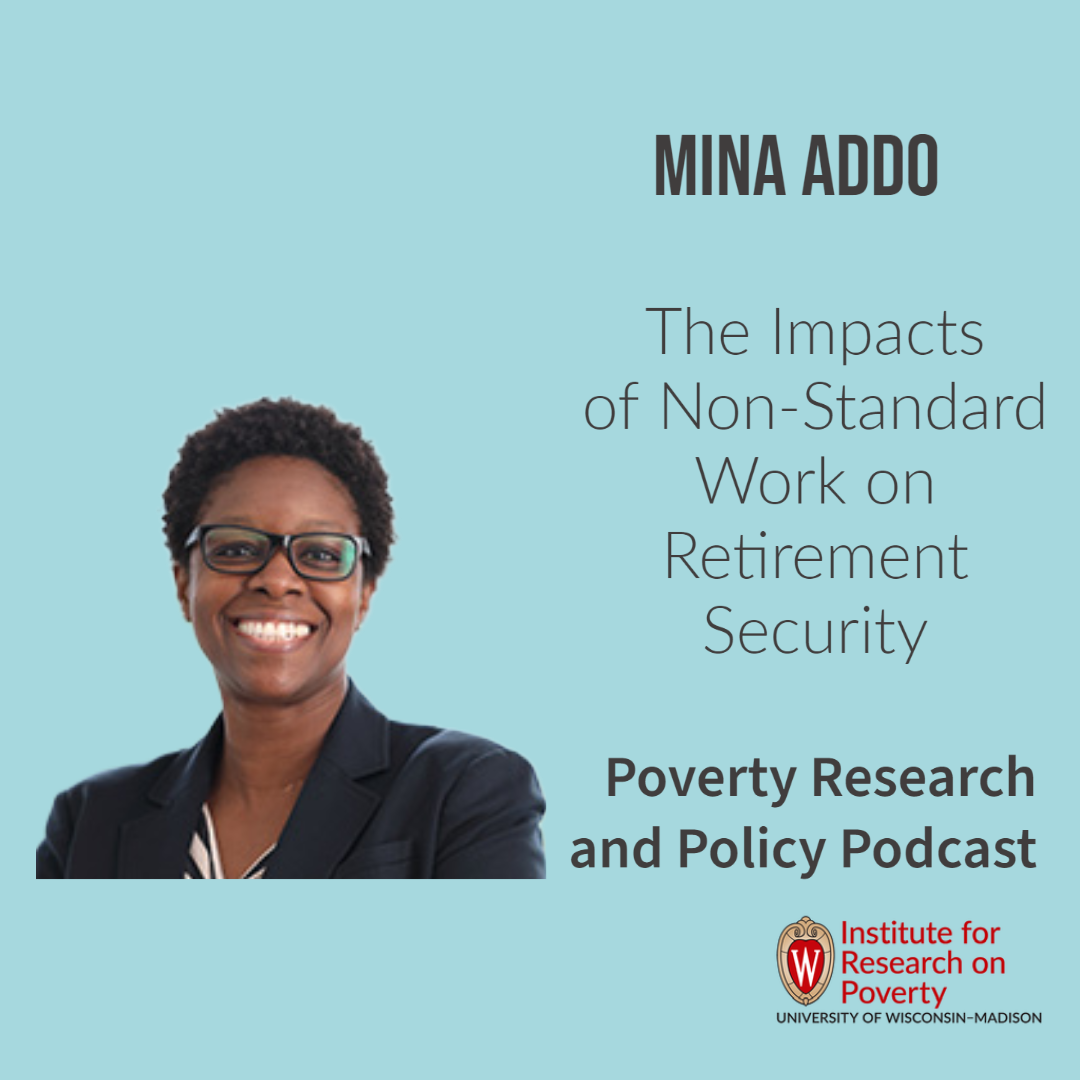
Poverty Research & PolicyMina Addo on the Impacts of Non-Standard Work on Retirement SecurityWhile non-standard work is not a new concept, technology has fueled a recent rise in independent contracting, freelancing, temporary, on-call, and "gig" work. Much of the research on non-standard work has focused on its precarious nature and lower economic security for active workers. In her recent paper, "The Retirement Implications of Non-Standard Work," Dr. Mina Addo turns her attention to the impacts on retirement security for the large numbers of U.S. workers are participating in non-standard work alone or in addition to traditional employment. Dr. Addo is an IRP National Poverty Fellow in residence at the O...
2023-06-2725 min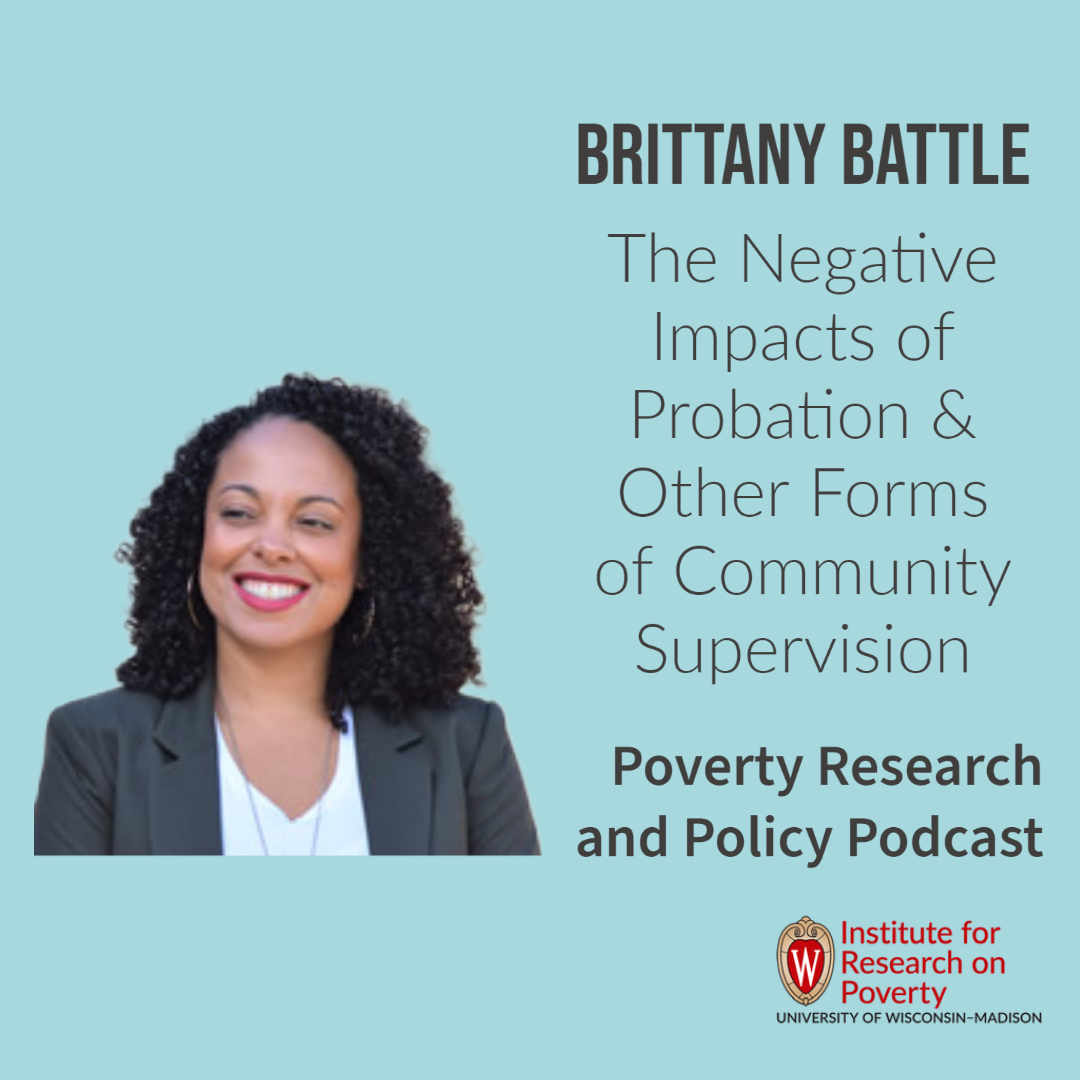
Poverty Research & PolicyBrittany Battle on the Negative Impacts of Probation and Other Types of Community SupervisionProbation is often considered to be a kinder, gentler alternative to incarceration. But there are significant financial and emotional costs associated with home confinement that affect not just the person who is under supervision, but their families and communities as well. In this episode, we hear from Dr. Brittany Battle. She is an Assistant Professor of Sociology at Wake Forest University and is also the co-founder of Triad Abolition Project, a grassroots organization based in Winston-Salem, NC. Dr. Battle is also an IRP Emerging Poverty Scholar, and her project during that fellowship is to examine the experiences...
2023-05-1123 min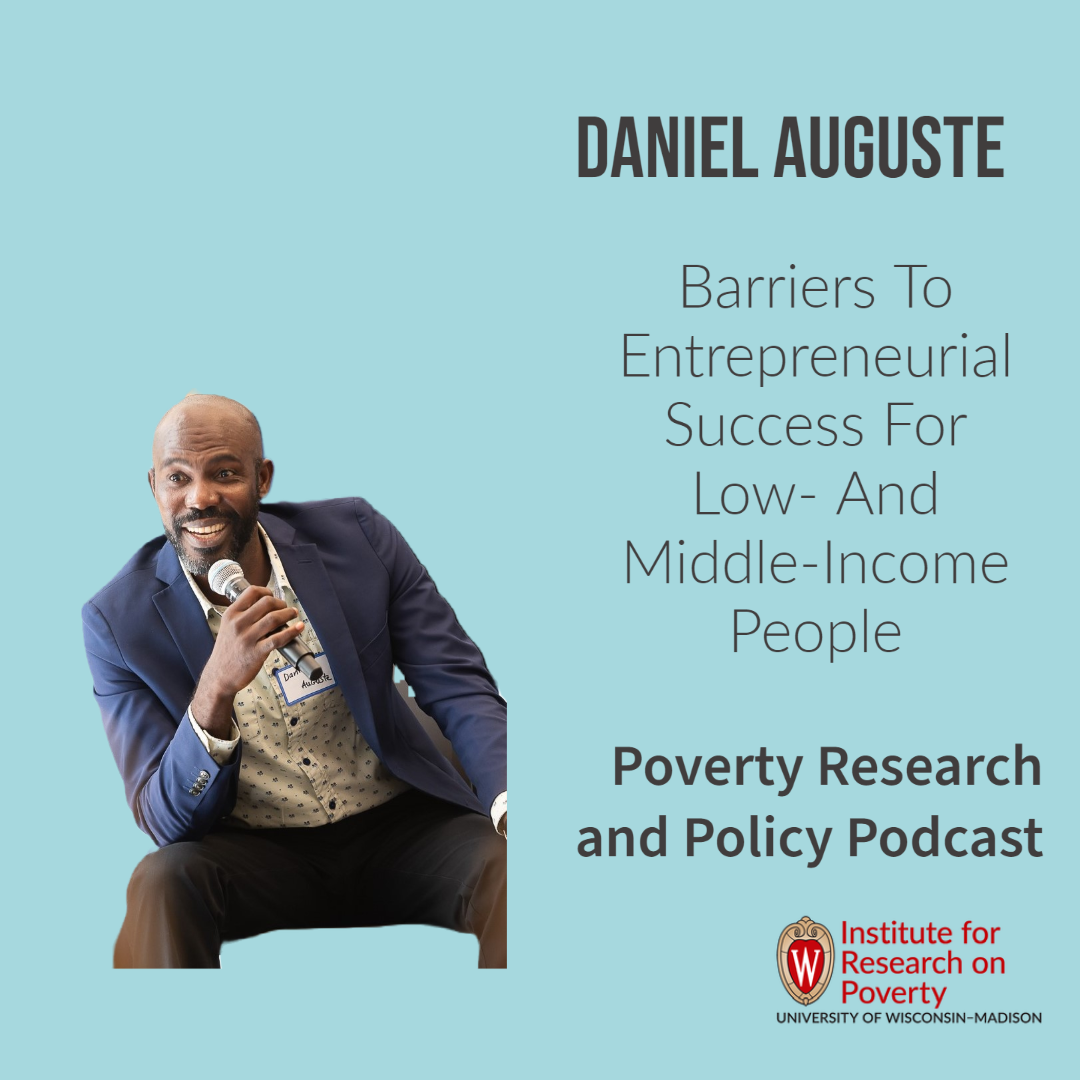
Poverty Research & PolicyDaniel Auguste On Barriers To Entrepreneurial Success For Low- And Middle-Income PeopleSelf-employment can be a choice, or undertaken by necessity. In the United States, on average, 10 to 12% of the labor force is engaged in some form of self-employment. That proportion can be higher in times of economic downturns, such as during the COVID-19 pandemic. But low- and middle-income workers face many obstacles to being successful in their entrepreneurial activities. In this episode, Dr. Daniel Auguste joins us to discuss the paper that he co-authored with Stephen Roll and Mathieu Despard, titled "The Precarity of Self-Employment among Low- and Moderate-Income Households." Dr. Auguste explains how self-employment can bring rewards, but also...
2023-04-2529 min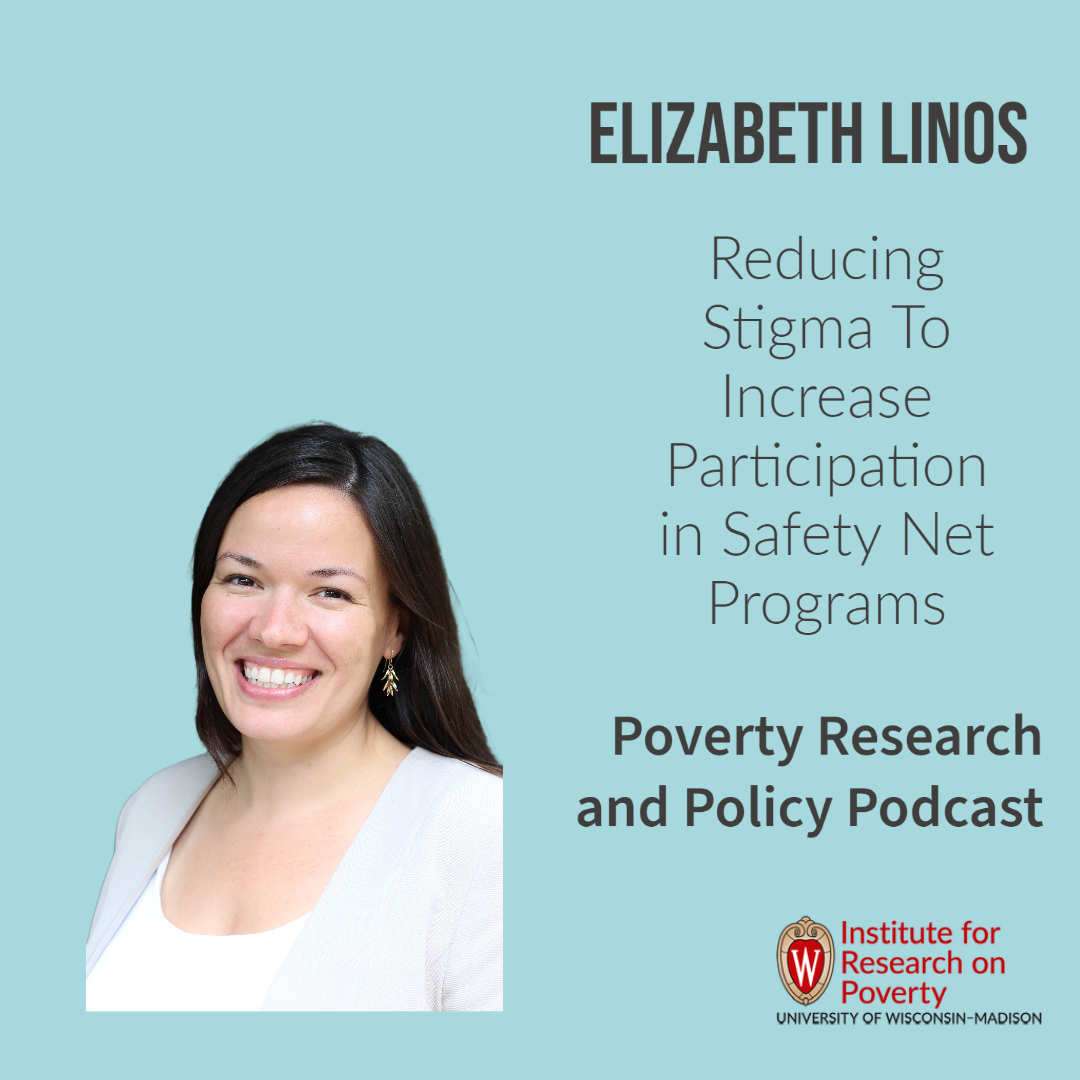
Poverty Research & PolicyElizabeth Linos on Reducing Stigma To Increase Participation in Safety Net ProgramsEstimates are that 20–50% of people eligible for social safety net programs don't access them. While there may be many factors contributing to that gap, recent research has focused on the role that stigma plays. In this episode, Dr. Elizabeth Linos joins us to discuss the paper she co-authored with Jessica Lasky-Fink, titled "It's Not Your Fault: Reducing Stigma Increases Take Up of Government Programs." Stigma can be direct or anticipated from the wider society, including from agency workers with whom people would need to interact in order to access services. Stigmatizing messages can be internalized as shame or guilt fo...
2023-03-1421 min
Poverty Research & PolicyDeyanira Nevarez Martinez On The Latinx Paradox And HomelessnessOfficial measures of homelessness seem to indicate that the Latinx community is less affected than most other minoritized racial groups. But this aspect of what is called "The Latinx Paradox" might in fact be due to the extent of homelessness in Latinx communities being obscured by other factors. In this episode, Dr. Deyanira Nevarez Martinez shares her research into the nuances of Latinx housing precarity, and why understanding the Latinx experience of homelessness is vital for effective public policy and human services provision. Dr. Nevarez Martinez is an Assistant Professor of Urban and Regional Planning at Michigan State University...
2023-02-2726 min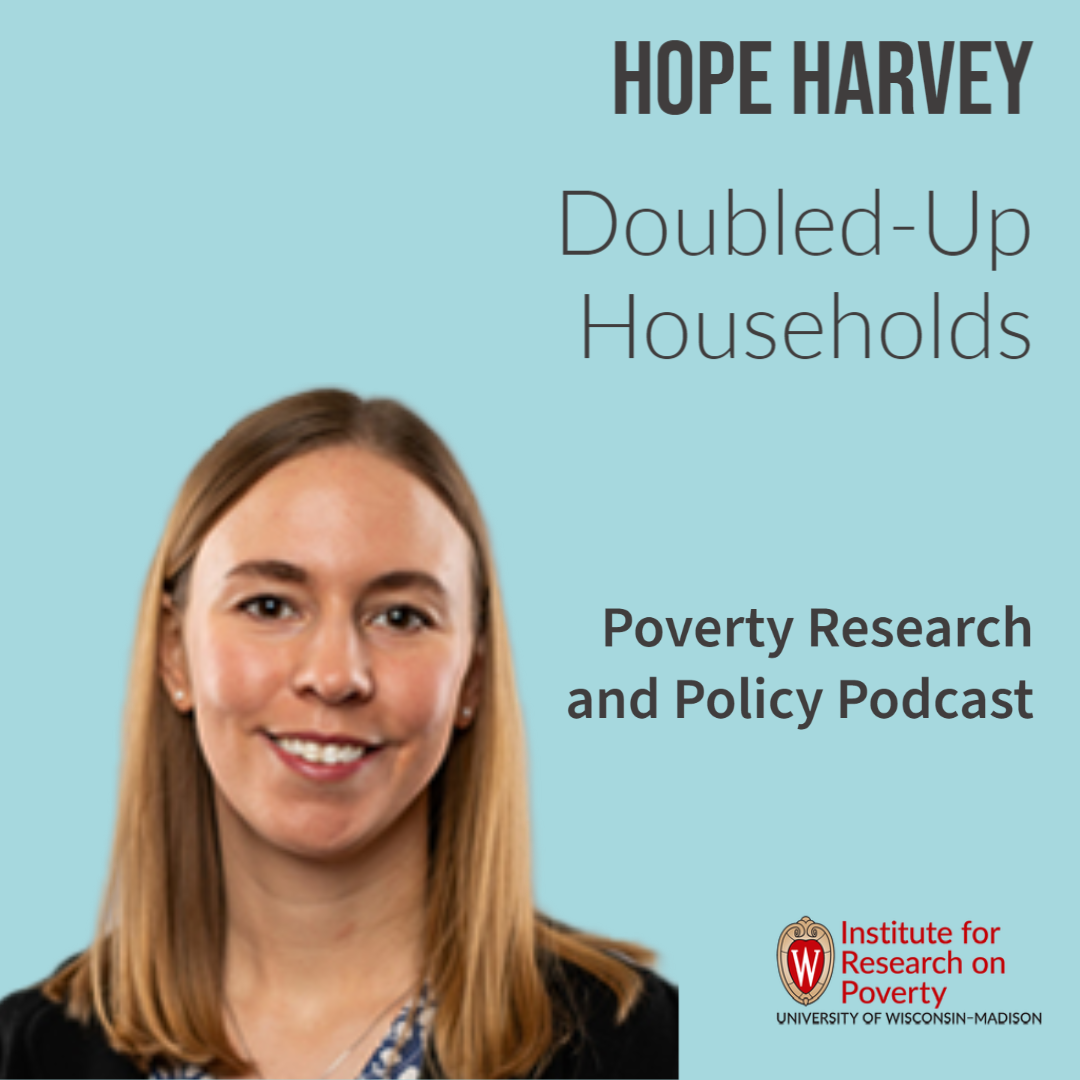
Poverty Research & PolicyHope Harvey on Doubled-Up HouseholdsIn this episode, we hear from Hope Harvey about doubled-up households in the United States and why she thinks we should be paying more attention to the situations of people who are living in shared households. Professor Harvey is an Assistant Professor of Public Policy at the University of Kentucky, where she is a research affiliate at the University of Kentucky Center for Poverty Research. She's also a 2022-2023 IRP Visiting Poverty Scholar. In the episode, Professor Harvey discusses two papers: Hope Harvey, Rachel Dunifon, and Natasha Pilkauskas. Under whose roof? Understanding the living arrangements o...
2022-12-0623 min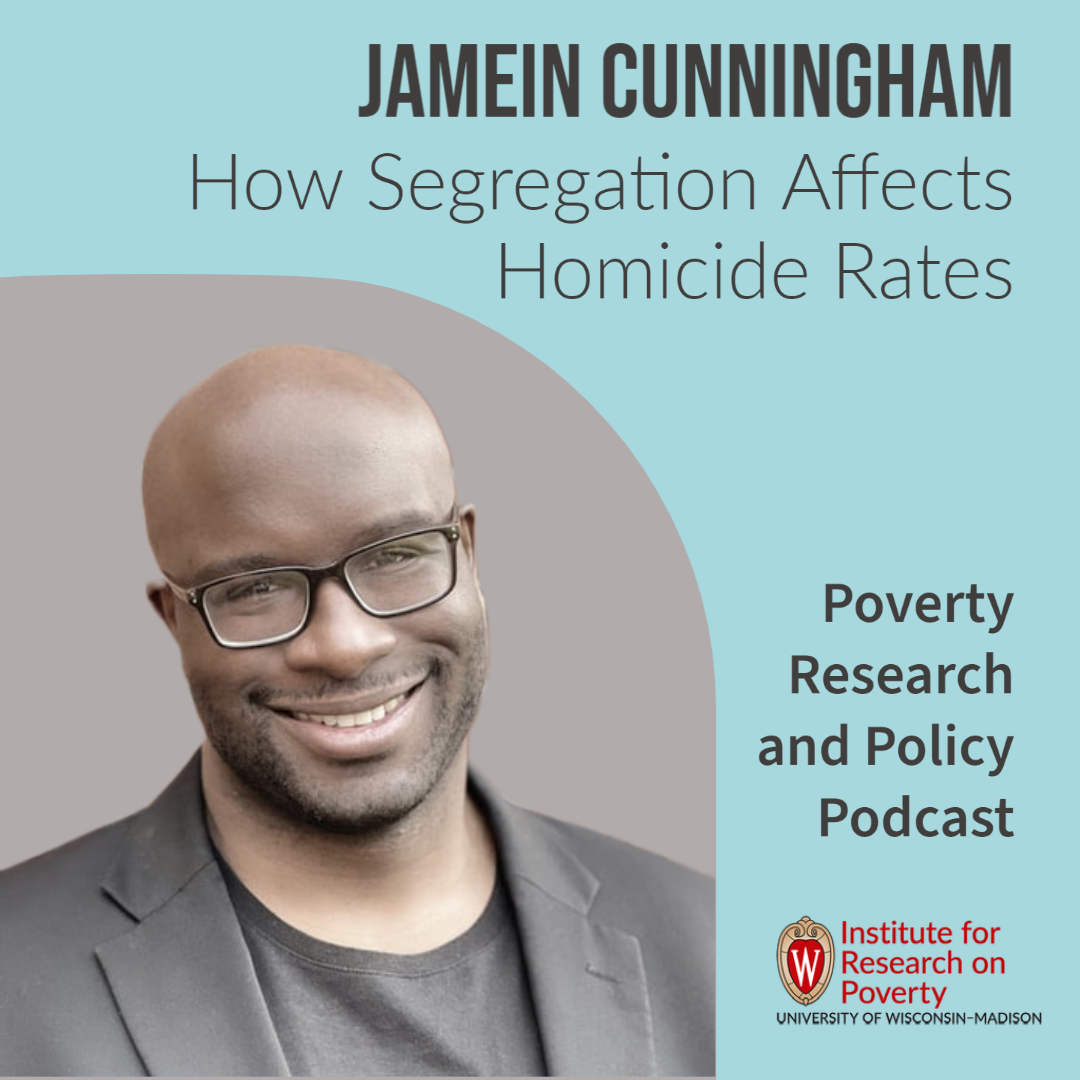
Poverty Research & PolicyJamein Cunningham on How Segregation Affects Homicide RatesHigh levels of segregation can have significant impacts on communities and the individuals living in them. New research uses railroad tracks as a measure of segregation and overlays data on homicide deaths to determine if people of color living in highly segregated communities are more at risk. In this episode, Dr. Jamein Cunningham shares the findings in the paper he co-authored with Robynn Cox, Alberto Ortega and Kenneth D. Whaley titled "Black Lives: The High Cost of Segregation." Cunningham is an assistant professor in the Jeb E. Brooks School of Public Policy at Cornell University and an IRP Emerging Po...
2022-11-2121 min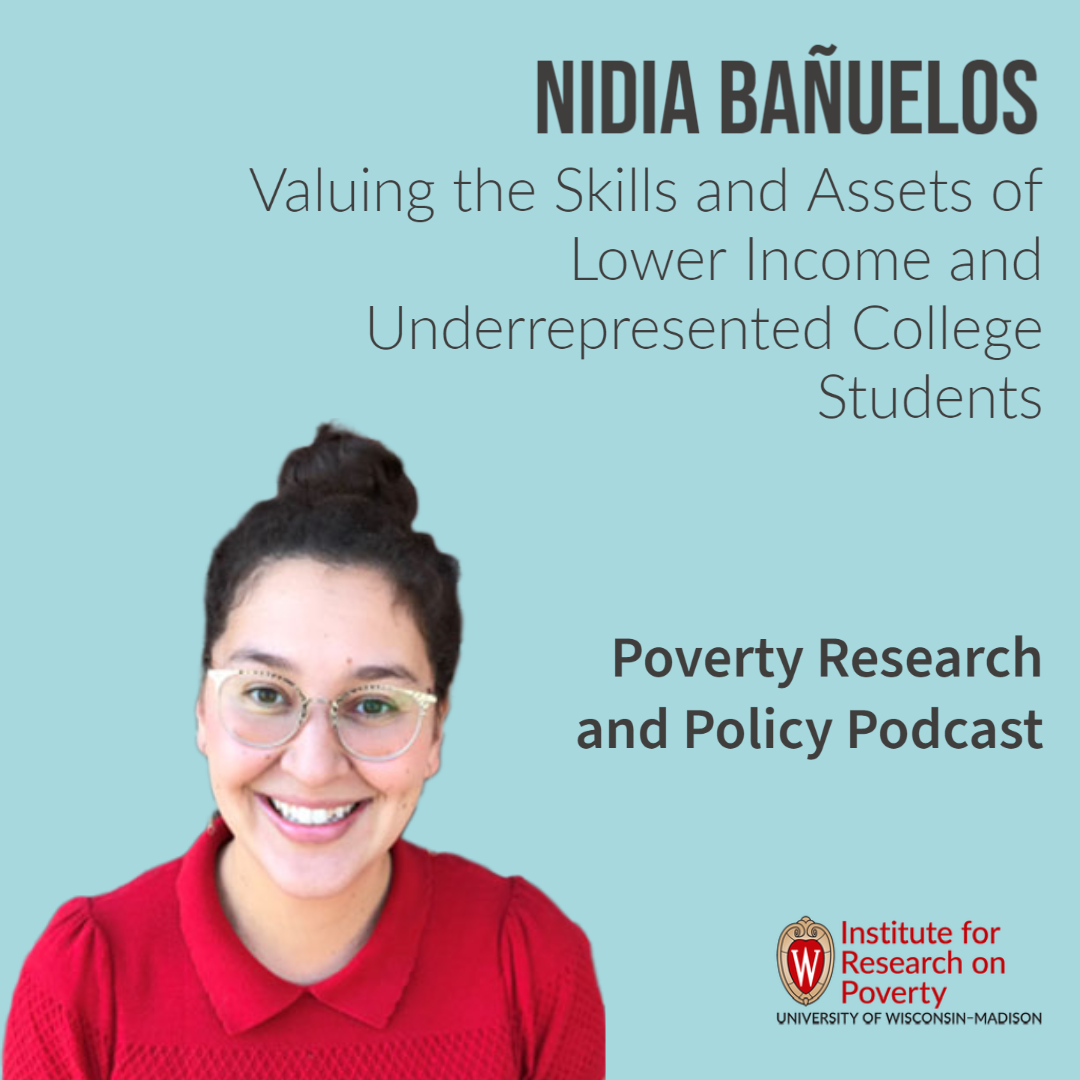
Poverty Research & PolicyNidia Bañuelos on Valuing the Skills and Assets of Lower Income and Underrepresented College StudentsIn this episode, we hear from Nidia Bañuelos about how we can better value and measure the assets that college students from low income and traditionally underserved backgrounds bring to their education and to their later careers. Bañuelos is an assistant professor in the Division of Continuing Studies at the University of Wisconsin-Madison and an IRP Affiliate. You can find recent work from Bañuelos and colleagues on using Community Cultural Wealth (CCW) frameworks to measure assets and social networks of college students though the Networks and Cultural Assets Project (NACA).
2022-10-2626 min
Poverty Research & PolicyDavid Brady on Labor Unions and U.S. PovertyLabor unions receive relatively little attention in U.S. poverty research and our guest for this episode, Professor David Brady, says that this is an unfortunate omission. His research in a paper with Tom VanHeuvelen finds that being in a household with a union member and even being in a state with higher rates of union membership are both correlated with a lower likelihood of being in poverty. Brady says we should pay attention to the role of unions because "political power drives the policies you get, and the policies you get drive the amount of poverty you have...
2022-10-1130 min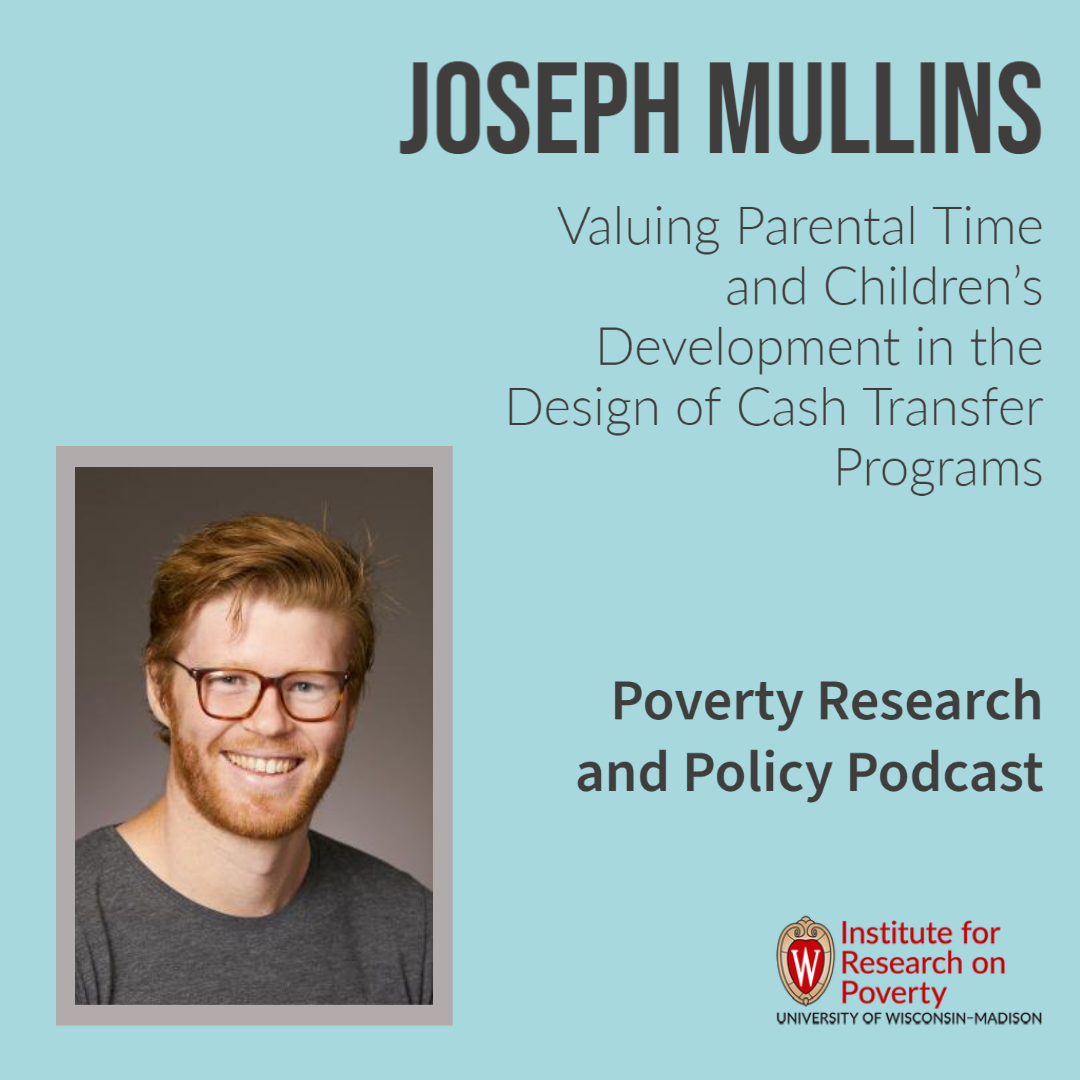
Poverty Research & PolicyJoseph Mullins on Valuing Parental Time and Children's Development in the Design of Cash Transfer ProgramsWhen it comes to cash transfer programs like welfare for single parents and especially mothers, most of the evaluation and economic modeling efforts have focused on how those programs impact the amount of paid work single parents do. However, there's been less attention to the value of parental time and how that matters for children's development. For this podcast episode, we hear from economist Joseph Mullins of the University of Minnesota, who developed an economic model for U.S. cash transfer programs that attempts to place an accurate value on parents' time when assessing cash transfers programs. He says...
2022-09-1530 min
Poverty Research & PolicyNick Hillman on the Federal Student Loan Forgiveness ActThe Biden administration's plan to alleviate federal student loan debt has the potential to reduce the debt of approximately 43 million Americans, and almost half of those borrowers will have their debt forgiven completely. The move has prompted praise from some, and strong criticism from others. In this episode, we're joined by Professor Nick Hillman, who studies educational inequality, college affordability, and student loan debt and default. Hillman is a professor in the Department of Educational Leadership and Policy Analysis at the University of Wisconsin-Madison. He also directs the Student Success through Applied Research Lab, which is a rese...
2022-08-3127 min
Poverty Research & PolicyYouth Trauma and Resilience in Contexts of Poverty with Noni Gaylord-Harden, Jocelyn Smith Lee, and Alvin ThomasIRP recently hosted Dr. Noni Gaylord-Harden, Dr. Jocelyn Smith Lee, and Dr. Alvin Thomas for a webinar conversation on Youth Trauma and Resilience in Contexts of Poverty. They discussed how a growing body of research has begun to change understandings of how toxic environments can affect young people, particularly African American boys and young men and how research, policy, and practice can incorporate these lessons. More information about the webinar can be found at https://www.irp.wisc.edu/resource/youth-trauma-and-resilience-in-contexts-of-poverty/.
2022-08-181h 04
Poverty Research & PolicyCasey Stockstill on Economic and Racial Segregation in PreschoolsFor this episode, we hear from Dr. Casey Stockstill about research she did to better understand economic and racial segregation in preschools. Dr. Stockstill spent time observing in two highly rated preschools in the same city: One was a Head Start location where nearly all of the children were students of color and from lower income families and the other was a private preschool in a more affluent part of town where nearly all the students were white and from higher income families. Her observations offer insights about how inequality and segregation in early childhood education can play out...
2022-07-2535 min
Poverty Research & PolicyKathryn Edin on the 25th Anniversary of "Making Ends Meet"2022 marks the 25th anniversary of the publication of Making Ends Meet: How Single Mothers Survive Welfare and Low Wage Work, by Kathryn Edin and Laura Lein. The book was based on interviews with low-income single moms that took place between the late 1980s and early 1990s. Edin and Lein detailed the women's household budgets, the strategies they used to support their families, and the unforgiving choice between welfare and low-wage work. In this episode, we hear from Kathryn Edin about what she learned from talking to these mothers and about the changes in U.S. antipoverty policy in the 25 ye...
2022-06-1539 min
Poverty Research & PolicyZawadi Rucks-Ahidiana on Race and the Financial ToolkitWhere we get information about money and how to manage it can have long-lasting impacts on financial security and wealth accumulation. While there are some commonly shared sources of information that shape our attitudes and beliefs, there are also some significant differences across racial and ethnic groups. In this episode, Dr. Zawadi Rucks-Ahidiana joins us to discuss her recent paper titled, "Race and the Financial Toolkit: Bridging Cultural Theories to Understand Behavior and Decision Making in the Racial Wealth Gap." Rucks-Ahidiana is an Assistant Professor of Sociology at University at Albany, State University of New York. Her...
2022-06-0224 min
Poverty Research & PolicyBrieanna Watters and Robert Stewart on Native Americans and Monetary SanctionsIn this episode of the Poverty Research & Policy Podcast, we hear from Brieanna Watters and Robert Stewart about a paper they coauthored* on Native Americans and Monetary Sanctions involving the criminal legal system. They discuss how Native American experiences in relation to the legal system are often unique, how the rural nature of Indian Country matters when it comes to policies around fines and fees, and how their research in Minnesota finds higher levels of fines and fees for Native American defendants, particularly in areas near reservations. Watters is a Ph.D. candidate in sociology at the University of Mi...
2022-05-1635 min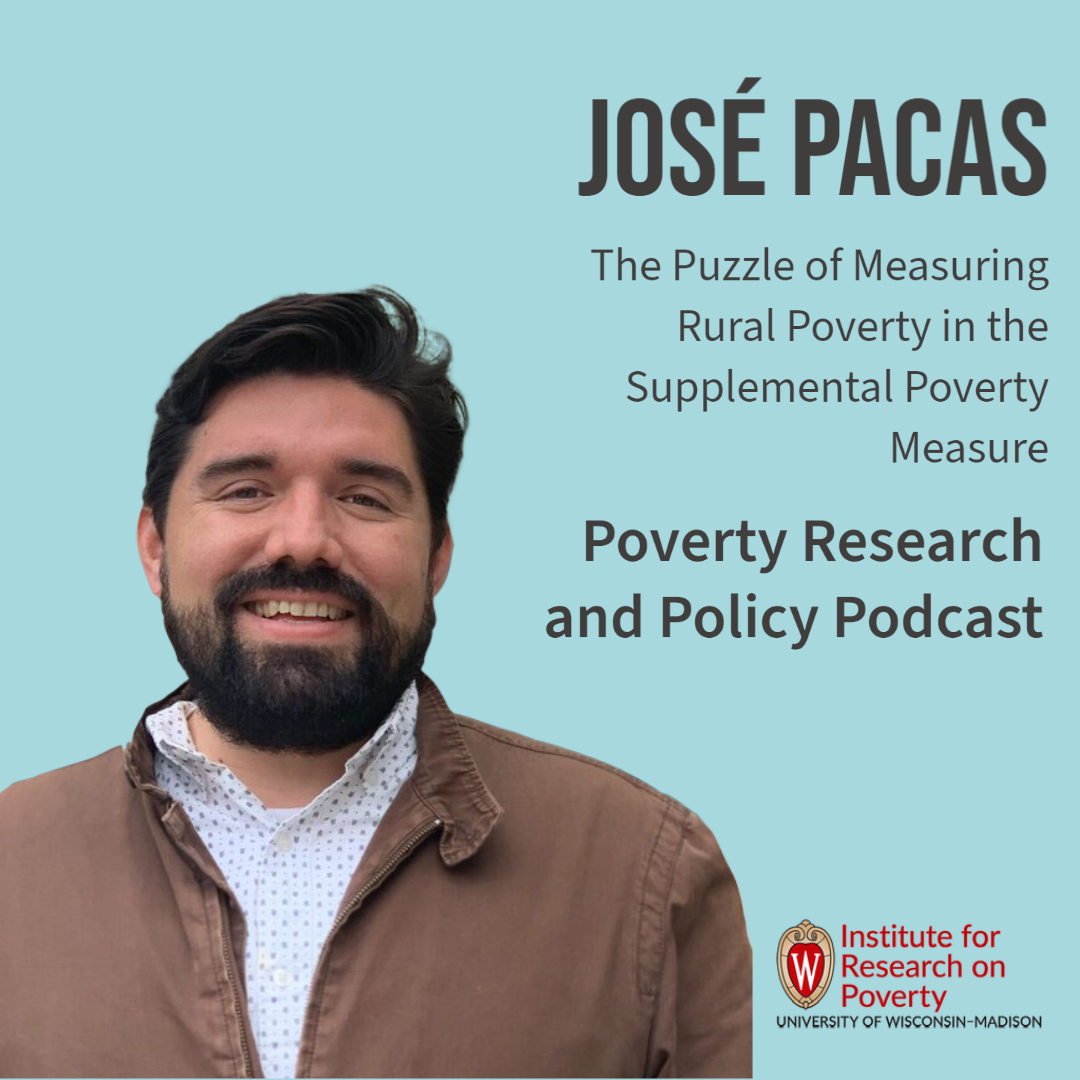
Poverty Research & PolicyJosé Pacas on the Puzzle of Measuring Rural Poverty in the Supplemental Poverty MeasureIn this episode, we hear from José Pacas about data challenges involved in measuring rural poverty in the Supplemental Poverty Measure or SPM and how the subtleties of poverty measurement can have real world implications for the lived experiences of low-income people in rural places. Dr. Pacas is currently serving on a National Academy of Sciences, Engineering, and Medicine panel on Evaluation and Improvements to the Supplemental Poverty Measure. He is Chief of Data Science and Research at Kids First Chicago and was previously a researcher at IPUMS at the University of Minnesota. Dr. Pacas was a 2019-2...
2022-04-2934 min
Poverty Research & PolicyWhitney Gent on How Homelessness is Portrayed in Movies and Why it MattersPeople experiencing homelessness are more often part of the background in movies than featured as the protagonists. But when they are the focus of a film, the ways that they and those who feel moved to help them are portrayed can have a big impact on how the public and policymakers think about homelessness and possible solutions. In this episode, we talk with Dr. Whitney Gent about what she and her coauthor found in their analysis of films featuring homeless characters from 1983 to 2018, and in particular the concepts of visibility and agency. Gent is an assistant professor...
2022-03-2134 min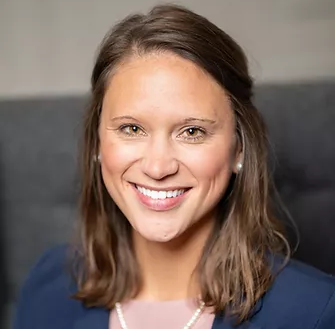
Poverty Research & PolicyLindsey Bullinger on Evaluating Risk of Child Maltreatment During the COVID-19 PandemicWhen the pandemic hit, many people who study child maltreatment, abuse, and neglect were worried that some children might be at greater risk due to more time at home and other factors that the pandemic could exacerbate. But at the same time, many children had less access to other adults who might be able to notice if something was wrong. For this episode, we talked with Dr. Lindsey Bullinger of Georgia Tech's School of Public Policy about how she and her colleagues went about trying to measure rates of child maltreatment early in the pandemic when many...
2022-03-0219 min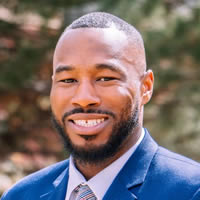
Poverty Research & PolicyPrentiss Dantzler on the Concept of Who Deserves to Have Access to Public HousingIn this episode, we hear from Professor Prentiss Dantzler about how perceptions of who lives in public housing – and who deserves that type of support – have developed over the past century, and how that has affected the urban poor and particularly people of color. His research includes reviewing the congressional testimony around the issue of providing housing for returning World War II GIs. Dantzler is an Assistant Professor of Sociology at the University of Toronto and a former IRP Visiting Scholar.
2022-02-0719 min
Poverty Research & PolicyQuentin Riser on Family Income Instability and How it Might Affect Kids' School ReadinessIn this episode, we hear from Dr. Quentin Riser about how family income instability in early childhood affects children's school readiness and later outcomes. He talks about how administrative data, such as in the Wisconsin Administrative Data Core, can offer a more complete picture of the financial ups and downs that young families face, and how that can matter for children later on in school.
2022-01-2019 min
Poverty Research & PolicyAndrea Elliott and Darcey Merritt in Conversation about Invisible Child: Poverty, Survival & Hope in an American CityIRP recently had the privilege of hosting New York Times reporter and author Andrea Elliott and NYU Professor of Social Work Darcey Merritt for a conversation about Elliot's book Invisible Child: Poverty, Survival & Hope in an American City. They talked about the family in the book, the child welfare system and race, how we think about meeting the needs of children, and how we can do better.
2022-01-131h 00
Poverty Research & PolicyAnna Gassman-Pines on Early Impacts of the Pandemic for Parents in Service OccupationsWhen the pandemic hit the United States in March of 2020, Anna Gassman-Pines and her colleague Elizabeth Ananat were already conducting a text message survey among service workers who had children. As early-pandemic lockdowns and business closures began, Gassman-Pines and Ananat were able to pivot and began asking the people they were surveying about job and income loss, challenges that stemmed from school and childcare shifts, whether they were able to access government benefits, and about their own mental health. In this podcast episode Gassman-Pines offers an overview of their findings and discusses how what they learned fits within the larger...
2021-12-2015 min
Poverty Research & PolicyAmy Castro On Early Results From Guaranteed Income ProgramsFor this episode of the Poverty Research and Policy Podcast, we hear from Professor Amy Castro about the concept of Basic Income, and what she and her team are learning from data coming in from pilot projects around the country. Professor Castro is Founding Director of the Center for Guaranteed Income Research and an Assistant Professor of Social Policy and Practice at the University of Pennsylvania. --- Transcript: Judith Siers-Poisson: Hello, and thanks for joining us for the poverty research and policy podcast from the Institute for research on poverty at the university of Wisconsin-Madison...
2021-12-1534 min
Poverty Research & PolicyAmelie Hecht on Universal Free School Meal ProgramsIn this episode we hear from Dr. Amelie Hecht about universal free school meal programs and how the pandemic may have shifted the outlook for this kind of program. Dr. Hecht is a fellow in the IRP National Poverty Fellows Program where she is in residence at the Office of Planning, Research and Evaluation at the federal Administration for Children and Families. Transcript: Dave Chancellor: Hello, and thanks for joining us for the Poverty Research and Policy podcast from the Institute for Research on Poverty at the University of Wisconsin–Madison. I'm Dave Ch...
2021-11-2914 min
Poverty Research & PolicyJuan Pedroza on Immigrant Health, Place, and the PandemicFor this episode of the Poverty Research and Policy Podcast, we hear from Juan Pedroza about immigration in the United States, the COVID-19 Pandemic, and how place matters when it comes to thinking about immigrant health. Pedroza is an Assistant Professor of Demography, Migration and Inequality in the Sociology Department at the University of California Santa Cruz and was a fellow in IRP's Emerging Poverty Scholars Program. You can find more of Professor Pedroza's work at www.socialdemography.xyz/ and follow him on twitter at @ijuanathesaurus If you would like to connect with other resources...
2021-11-1724 min
Poverty Research & PolicyJudi Bartfeld on Food Insecurity Rates and the Increase in SNAP BenefitsIn this episode, Judi Bartfeld shares how the COVID-19 pandemic, and the social safety net's response to it, has affected food insecurity in the United States. She also explains how the permanent increase in SNAP benefits that took effect October 1, 2021, fits into the larger picture of ensuring that people have consistent access to nourishing foods. Dr. Bartfeld is a professor in the School of Human Ecology at UW-Madison and is also a food security research and policy specialist in the Division of Extension at UW, and is an IRP faculty affiliate.
2021-10-1526 min
Poverty Research & PolicyMustafa Hussein on the Broader Effects of Local Living Wage OrdinancesIn this episode, Mustafa Hussein talks about living wage ordinances that were passed in the 1990s and 2000s in cities across the United States. These ordinances were only directed at relatively small groups of lower wage workers in these cities, but Dr. Hussein and his team set out to see if these smaller ordinances would have larger impacts on these local labor markets. Dr. Hussein is an assistant professor of health policy and economics at the City University of New York's Graduate School of Public Health and an IRP faculty affiliate.
2021-09-3025 min
Poverty Research & PolicyJ. Michael Collins on whether allowances help to develop financial capabilityIn this episode, we hear from IRP Affiliate J. Michael Collins, Professor of Public Affairs and Consumer Science at UW-Madison and the director of the Center for Financial Security. He talks about whether parents from different racial and ethnic groups and with varying income levels are more or less likely to give their children an allowance. He also explains what parents might be hoping to achieve by giving their child money that they manage themselves, and whether that translates into more financial capability as a young adult.
2021-09-1320 min
Poverty Research & PolicyAdrian Huerta on the School Experiences of Gang-Associated YouthIn this episode we hear from Adrian Huerta of the Rossier School of Education at the University of Southern California. Huerta shares his research that came from talking to gang-associated youth in high school, what their education experiences looked like, and how that translated to what they thought about the options they had when it came to going to college.
2021-07-0128 min
Poverty Research & PolicyMaia Cucchiara on the Hidden Curriculum of Parenting EducationFor this episode, we hear from Maia Cucchiara, a professor of Urban Education at Temple University. She talks about low-income mothers' experiences with parenting education courses, which are designed to teach parenting techniques and about things like child development. They might be offered in schools or community settings and participation is sometimes voluntary, sometimes included as part of participation in other programs, and sometimes mandated as part of a court decision, for example. The interview draws on a paper she wrote on the hidden curriculum of parenting education. We hear about what was taught in the classes she observed...
2021-06-1527 min
Poverty Research & PolicyAndria Smythe on the College Outcomes of Young Adults in a RecessionThere's a sort of conventional wisdom that during recessions, more people enroll in college or stay in college longer when jobs are scarce. But it's not clear that this "benefit" extends to everyone. In this episode, Howard University economist Andria Smythe talks about her research looking at how college outcomes of young adults shifted during a recession and how she found that those from disadvantaged backgrounds' levels of college completion were hurt more during a recession.
2021-05-1716 min
Poverty Research & PolicyKatherine Magnuson on the American Families Plan and Child Care as InfrastructureIn this episode, we hear from IRP Director Katherine Magnuson about components of the just-released American Families Plan. Magnuson discusses parental leave, funding for child care, universal pre-kindergarten, and expansions of child tax credits. She says efforts to support parents and invest in families can help them to meet their goals and do what they want to do for their children and for themselves.
2021-05-0718 min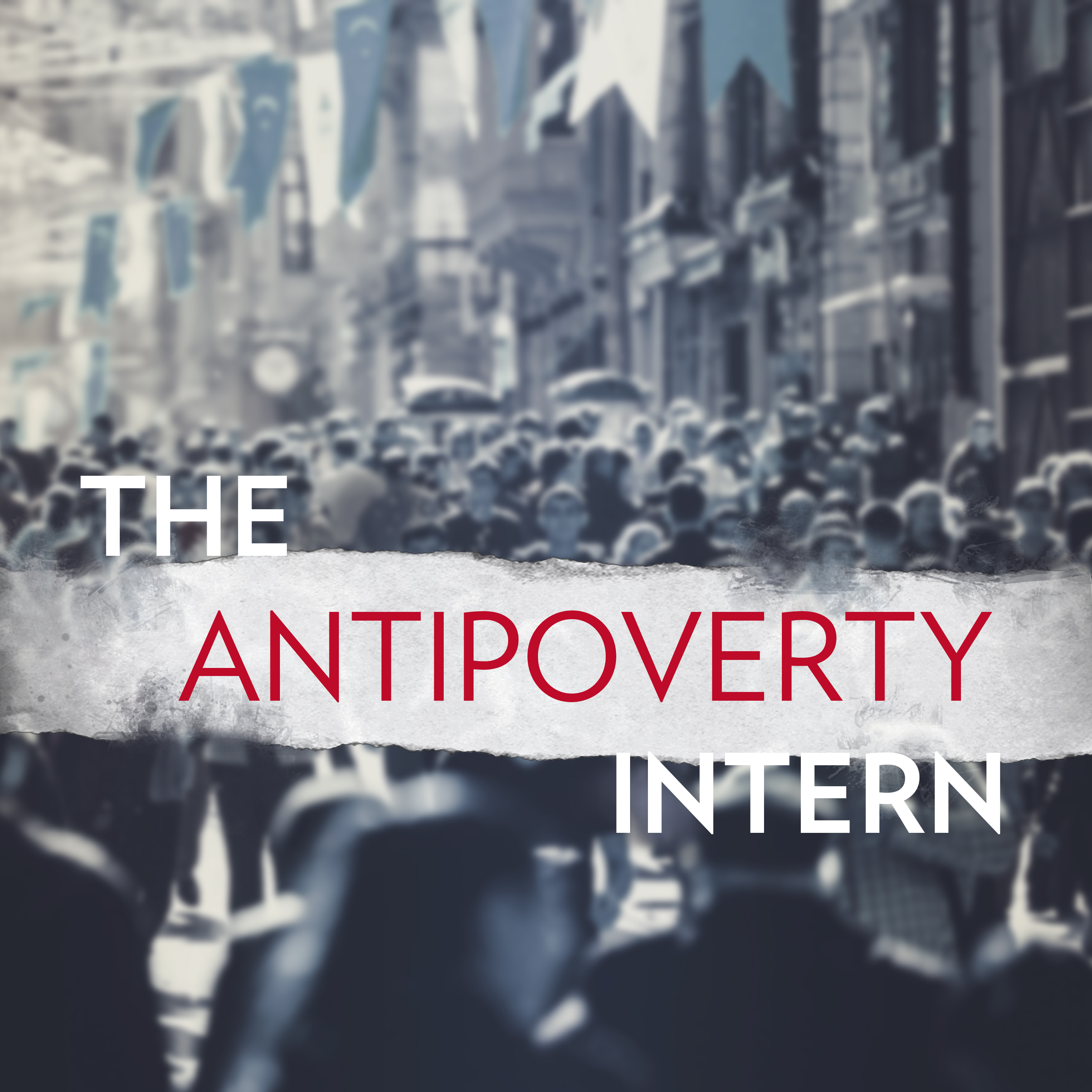
Poverty Research & PolicyThe Anti-Poverty Intern: Episode 5: Joshua WrightIn this episode, we hear from Joshua Wright, Community Project Coordinator with the Cancer Health Disparities Initiative at the UW Carbone Cancer Center. Wright shares the importance of making and keeping connections within the community both for educational and career purposes, and how getting involved with local efforts can lead to valuable experiences and relationships.
2021-05-0418 min
Poverty Research & PolicyThe Anti-Poverty Intern: Episode 4: Kadijha Marquardt-DavisIn this episode, we hear from Kadijha Marquardt-Davis, who was a legislative assistant in the Wisconsin State Legislature at the time of the interview and has since become policy advisor for a representative in the legislature. In the interview, Marquardt-Davis talks about how she became interested in policy, tips for transitioning from school to the professional world, and the importance of finding a mentor.
2021-04-2712 min
Poverty Research & PolicyThe Anti-Poverty Intern: Episode 3: Kim SutterIn this episode we hear from Kim Sutter, Director of Services for Porchlight, which is the largest provider of low-cost housing and homeless services in Dane County, Wisconsin. Sutter holds an undergraduate degree in social work from UW-Madison and shares her career path to oversees multiple programs as well as a large staff and volunteers. She also explains how the COVID-19 pandemic affected the homeless population and how Porchlight could provide services.
2021-04-1317 min
Poverty Research & PolicyKathryn Anne Edwards on Women Leaving the Labor Force in the COVID-19 PandemicA striking number of women, and especially moms, have left the U.S. labor force since the start of the coronavirus pandemic. In this podcast episode, labor economist Kathryn Anne Edwards talks about some of the patterns she's seen around why women are leaving the labor force and how the lack of support for working parents could roll back the gains we've seen in women's work and the economic benefits that have come with them.
2021-04-0830 min
Poverty Research & PolicyChloe Gibbs on Full-Day Kindergarten and its Impact on Academic AchievementIn the last few decades, there has been a major expansion in the number of states and localities offering full-day kindergarten. In this podcast episode, economist Chloe Gibbs of the University of Notre Dame talks about how these expansions impacted academic achievement and outcomes at the school district level.
2021-03-1119 min
Poverty Research & PolicyTimothy Smeeding on Proposals for a Refundable Monthly Child Tax CreditIn this episode, Timothy Smeeding talks about proposals from Senator Mitt Romney and from Democratic leadership for a fully refundable monthly child tax credit or child allowance and how these types of policies could reduce child poverty and help working parents in the pandemic and beyond. Smeeding is the Lee Rainwater Distinguished Professor of Public Affairs and Economics at the La Follette School of Public Affairs at the University of Wisconsin-Madison. He was Director of the Institute for Research on Poverty from 2008-2014.
2021-03-0523 min
Poverty Research & PolicyJacob Faber on How a New Deal Era Program Shaped America's Racial GeographyIn this episode we hear from Jacob Faber of New York University about a federal government program called the Home Owners' Loan Corporation that started in the 1930s and how the decisions made in that program promoted residential segregation that is still with us today.
2021-02-1716 min
Poverty Research & PolicyPamela Oliver on What the Numbers Say About How to Reduce Imprisonment, Part 2The goal of reducing incarceration has been gaining traction for at least the last decade in the United States. In an interview we did with sociologist Pamela Oliver in late 2020, she talked about how we got to where we are today when it comes to U.S. imprisonment (Part 1) and the impact that different reforms would have on reducing the U.S. prison population (Part 2). The interview is based on a paper Professor Oliver wrote for the Marquette Law Review (Volume 103, Issue 3).
2021-02-0115 min
Poverty Research & PolicyPamela Oliver on What the Numbers Say About How to Reduce Imprisonment, Part 1The goal of reducing incarceration has been gaining traction for at least the last decade in the United States. In an interview we did with sociologist Pamela Oliver in late 2020, she talked about how we got to where we are today when it comes to U.S. imprisonment and the impact that different reforms would have on reducing the U.S. prison population. This is part 1 of the interview. The interview is based on a paper Professor Oliver wrote for the Marquette Law Review (Volume 103, Issue 3).
2021-01-2515 min
Poverty Research & PolicyCarolyn Heinrich on Whether the Labor Market Offers the Same "Credit" for Online LearningIn this episode, Carolyn Heinrich of Vanderbilt University talks about a study she conducted with Jennifer Darling-Aduana, Annalee Good, and Huiping (Emily) Cheng that looked at the use of online education products in high schools to help students who were falling behind. Heinrich describes her team's observations of online course-taking and the longer-term academic and labor market outcomes of students in online settings versus those in traditional instruction. They find that, on average, students who took more credit recovery courses in online settings generally fared worse. Heinrich says that this raises equity concerns and asks if we are "disadvantaging...
2021-01-1132 min
Poverty Research & PolicyThe Anti-Poverty Intern: Episode 2: Eleanor PrattIn this episode we hear from Eleanor Pratt, a grant writer with the Heartland Alliance and recent graduate of the La Follette School of Public Affairs at the University of Wisconsin-Madison. Pratt talks about the importance of developing writing and editing skills, what she's learned from her experiences, and the challenge of doing anti-poverty work.
2020-11-1718 min
Poverty Research & PolicyThe Anti-Poverty Intern: Episode 1: Troy M. WilliamsFor the first episode of the Anti-Poverty Intern, host Simon Guma talks to UW–Madison PhD candidate Troy M. Williams. They discuss Williams' path to pursuing a PhD at UW–Madison's School of Human Ecology, advice for students and researchers who are engaging with members of their communities, and the challenges of working in institutions that still have a lot of work to do when it comes to issues of race.
2020-10-2025 min
Poverty Research & PolicyEric Chyn on the Impacts of Removing Children from Abusive or Neglectful HomesIn this episode we hear from economist Eric Chyn about the impact of home removal—for reasons like neglect or abuse—on children's later outcomes. In a paper he co-wrote with Anthony Bald, Justine Hastings, and Margarita Machelett, their perhaps surprising main result is that temporary home removal increases later test scores and reduces grade repetition for young girls, but doesn't show any significant impacts for young boys. Dr. Chyn is an assistant professor of economics at Dartmouth College and a faculty research fellow at the National Bureau of Economic Research. The paper he talks about in this...
2020-08-1413 min
Poverty Research & PolicyTroy M. Williams and Simon Guma on Community Engagement and Institutional ChangeIn this episode, IRP and Morgridge Center for Public Service media intern Simon Guma talks to Troy M. Williams. They discuss Williams' path to pursuing a PhD at UW-Madison's School of Human Ecology, advice for students and researchers who are engaging with members of their communities, and the challenges of working in institutions that still have a lot of work to do when it comes to issues of race.
2020-07-1626 min
Poverty Research & PolicyStephanie Canizales on the Experiences of Undocumented and Unaccompanied Youth WorkersIn this episode, Stephanie Canizales of the University of California, Merced discusses her work talking to undocumented and unaccompanied youth workers in Los Angeles about their experiences and struggles with work and social integration in the United States. Read the transcript at https://www.irp.wisc.edu/resource/stephanie-canizales-on-the-experiences-of-undocumented-and-unaccompanied-youth-workers/
2020-06-2725 min
Poverty Research & PolicyMario Small on How Social Networks and Social Capital Matter for Human Services ProgramsMario Luis Small of Harvard University talks about social networks and social capital and about some of his work looking at those things in the context of programs like Head Start. Read the transcript at https://www.irp.wisc.edu/resource/mario-small-on-how-social-networks-and-social-capital-matter-for-human-services-programs/
2020-05-1930 min
Poverty Research & PolicySarah Halpern-Meekin on "Social Poverty"This episode features Professor Sarah Halpern-Meekin, who discusses work from her 2019 book, Social Poverty. Halpern-Meekin is a sociologist at UW-Madison's School of Human Ecology and La Follette School of Public Affairs.
2020-04-1533 min
Poverty Research & PolicyPeter Blair on Occupational Licenses and What They Signal in the Job MarketIn this episode, Peter Blair of Harvard University talks about a paper called "Job Market Signaling through Occupational Licensing" he wrote with Bobby Chung that looks at how licenses people need for jobs contribute to differences in pay and if the story is different depending on someone's race or gender. He also talks about culture challenges in the economics profession, mentoring, and how growing up in the Bahamas influenced some of his goals as an economist.
2020-03-3122 min
Poverty Research & PolicyJessica Calarco on Parents and the Power of Privilege in SchoolsWe've all heard stories about the rise in helicopter parenting—parents who do their kids' homework, drop off things at school for them that they've forgotten, and intervene to smooth the path for their children. It's become so common that many schools now have rules against this kind of parental behavior. But our guest for this episode, sociologist Jessica Calarco of Indiana University, says that for many privileged parents and families, these rules just don't seem to apply. She set out to find out why and tells us about it in this podcast episode.
2020-02-2419 min
Poverty Research & PolicyAngela Guarin: Do Low-Income Noncustodial Fathers "Trade" Earlier Families for New Ones?For this episode, we hear from Angela Guarin about a paper she wrote with Lonnie Berger, Maria Cancian, and Dan Meyer that tries to understand how low-income noncustodial fathers who have children in more than one household make decisions when it comes to supporting their children. Guarin is a postdoctoral fellow at Los Andes University in Colombia and was a graduate research fellow at the Institute for Research on Poverty while earning her Ph.D. in social welfare at the University of Wisconsin-Madison.
2020-02-1215 min
Poverty Research & PolicyLars Højsgaard Andersen on the Consequences of Lowering Welfare Benefits for Migrants and Their FamiliesFor this episode, we hear from Lars Højsgaard Andersen of Denmark's Rockwool Foundation about a policy change in Denmark that aimed to increase employment among refugees to the country by reducing public benefits. The policy change brought a number of consequences — some intended, some not — that could inform similar policies being implemented in other countries.
2020-01-0729 min
Poverty Research & PolicyMichael Strain: The American Dream Isn't DeadThis episode features Michael Strain, the Economic Policy Director at the American Enterprise Institute, who gave a talk at IRP earlier this year titled "The American Dream isn't Dead." It's a provocative title and Strain says that this line of work is growing out of concerns he has about the narrative around the American Dream.
2019-11-1318 min
Poverty Research & PolicyLeslie Hodges on Unemployment Insurance and Material HardshipsIn this episode, we hear from IRP postdoctoral scholar Leslie Hodges about the Unemployment Insurance program and how the program might mitigate economic distress, including poverty and material hardships, when someone loses a job.
2019-10-1515 min
Poverty Research & PolicyBrian Thiede on the Rural Economy and Barriers to Work in Rural AmericaThere has been renewed interest in issues facing the U.S. rural economy in recent years. In this episode, Penn State sociologist and demographer Brian Thiede breaks down some of the key changes that have taken place in the rural labor market and discusses potential policy responses to barriers to work faced by rural Americans.
2019-09-3020 min
Poverty Research & PolicyAaron Sojourner and Matt Wiswall on the Value of Investments in Quality Child CareIn this episode, we hear from economists Aaron Sojourner and Matt Wiswall about the value of investments in quality child care and how we can think about tradeoffs when it comes to child care subsidies and related policies.
2019-08-0519 min
Poverty Research & PolicyDamon Jones on Whether a Modest Basic Income Might Lead People to Work LessThe idea of a universal basic income has been gaining traction in recent years, but we don't have much evidence about what a large-scale universal basic income policy would do. In this episode, University of Chicago economist Damon Jones talks about the idea of a universal basic income and discusses a study he did with Ioana Marinescu that looked at the Alaska Permanent Fund to better understand the labor market effects of universal and permanent cash payments.
2019-07-1823 min
Poverty Research & PolicyMarci Ybarra on the Administrative Burdens of Research in Non-Profit SettingsThe concept of administrative burden focuses on how bureaucracy, complex paperwork, and confusing regulations can reduce the effectiveness of public programs and limit the rights of citizens. In this podcast episode, University of Chicago professor Marci Ybarra argues that research conducted in non-profit settings can introduce similar types of burdens by putting additional demands on those being served and on workers, and by changing the incentives for agencies themselves.
2019-05-2816 min
Poverty Research & PolicyWalter Stern on Race and Education in New Orleans: Creating the Segregated CityIn this episode, we hear from Walter Stern, an assistant professor in the History and Educational Policy Studies departments at the University of Wisconsin-Madison. He discusses his recent book called Race and Education in New Orleans: Creating the Segregated City. His book, which focuses on the period from 1764-1960, looks at the role that schools played in the segregation of American cities with a particular focus on New Orleans.
2019-04-2627 min
Poverty Research & PolicyMaria Cancian and Dan Meyer on Final Results from the CSPED Impact EvaluationIn this episode, Maria Cancian and Daniel Meyer discuss the Child Support Noncustodial Parent Employment Demonstration or CSPED, a large, eight state experiment that aimed to see if a different approach to child support could lead to better outcomes. Over the course of the episode, they talk about how the CSPED project came to be, what it looked like for child support offices to change their approach to child support services for this demonstration, and what they learned. Cancian is the Dean of the McCourt School of Public Policy at Georgetown University and an affiliate an...
2019-03-1441 min
Poverty Research & PolicyJordan Conwell on Parental Income, Race, Gender, and Children's School ReadinessIn this podcast episode, sociologist Jordan Conwell of the University of Wisconsin-Madison talks about a study he did that aims to help us understand racial income inequality by looking for differences in how children of different races and genders, but the same family income, fare in early educational measures.
2019-02-0118 min
Poverty Research & PolicyLenna Nepomnyaschy on the Role of Fathers in Reducing Inequalities in Child OutcomesIn this podcast episode, Lenna Nepomnyaschy of the Rutgers School of Social Work talks about a study she did with Dan Miller, Maureen Waller, and Allison Dwyer Emory that looks at how father involvement matters for reducing socioeconomic inequalities in child outcomes.
2019-01-1514 min
Poverty Research & PolicyJacob Bastian on the Real Costs of the EITCIn this episode, Jacob Bastian of the University of Chicago's Harris School of Public Policy discusses his research with the Census Bureau's Maggie Jones on the real public costs of the Earned Income Tax Credit.
2018-11-2711 min
Poverty Research & PolicyMichael Light on Rates of Violence and the Consequences of SegregationIn this episode, University of Wisconsin-Madison sociologist Michael Light talks about a paper he co-authored with Julia Thomas looking at the consequences of segregation and whether whites benefit from segregation when it comes to rates of violence.
2018-11-0221 min
Poverty Research & PolicyBeth Vaade, Kerry Lawton, and Eric Grodsky on Research-Practice Partnerships in EducationIn this episode of the Poverty Research and Policy Podcast, Beth Vaade of the Madison Metropolitan School District, Kerry Lawton of the Wisconsin Department of Public Instruction, and Eric Grodsky, a professor of Sociology and Educational Policy Studies at the University of Wisconsin-Madison, discuss their experiences developing and working in research-practice partnerships in education.
2018-09-0746 min
Poverty Research & PolicyHeather Hill on Why Disruptions in Income Might Matter for Child DevelopmentIn this podcast episode, Heather Hill of the University of Washington's Evan's School of Public Policy and Governance discusses her research on income dynamics and why income disruptions might matter for children's cognitive, social, and emotional outcomes.
2018-08-0124 min
Poverty Research & PolicyMaria Cancian On Changing Families And Changing Child Support PoliciesIn this podcast episode, University of Wisconsin–Madison Professor of Public Affairs and Social Work Maria Cancian talks about the changing demographics of U.S. families and the challenges this creates for the child support system.
2018-07-0521 min